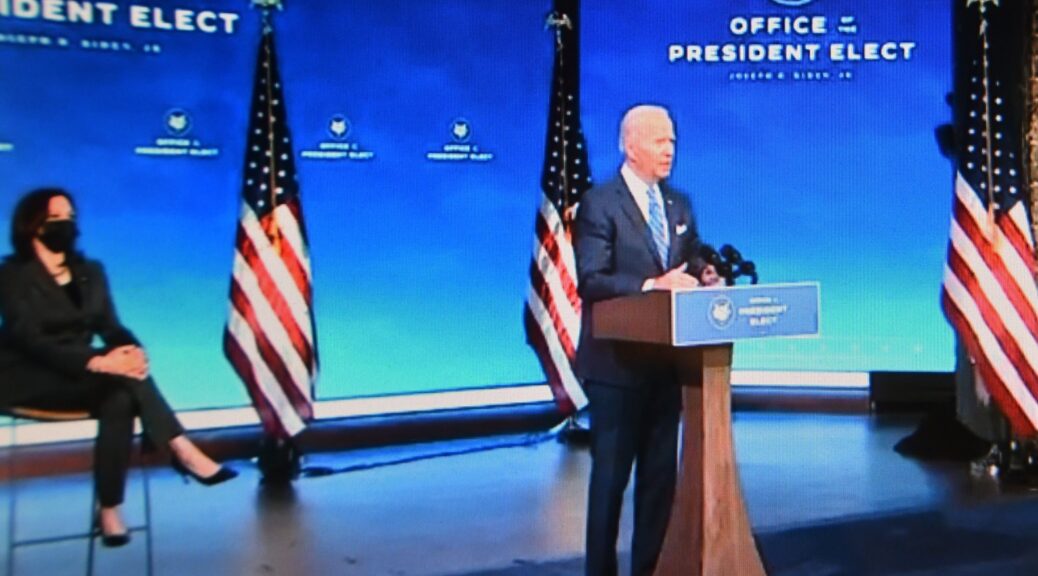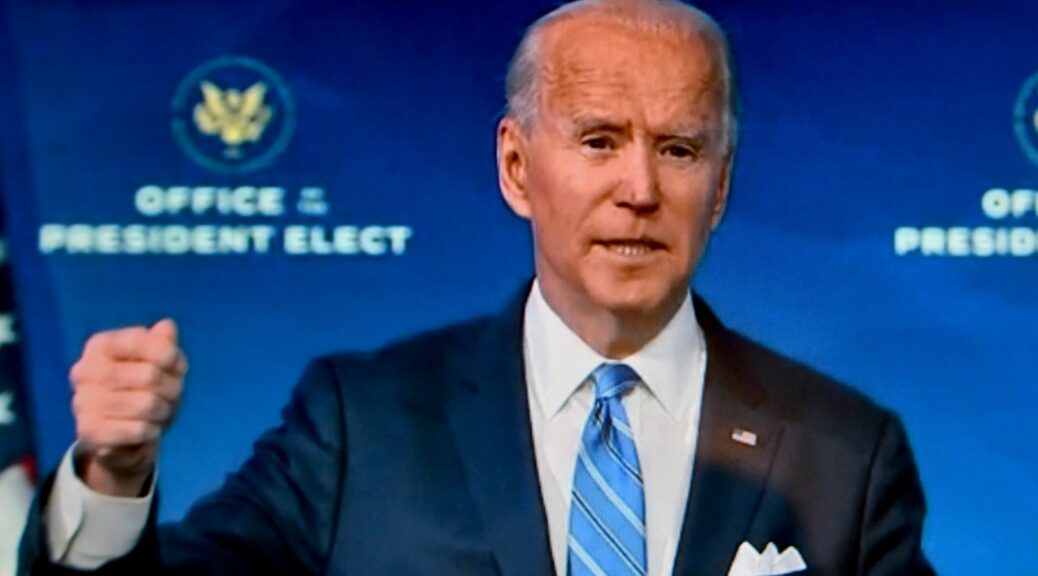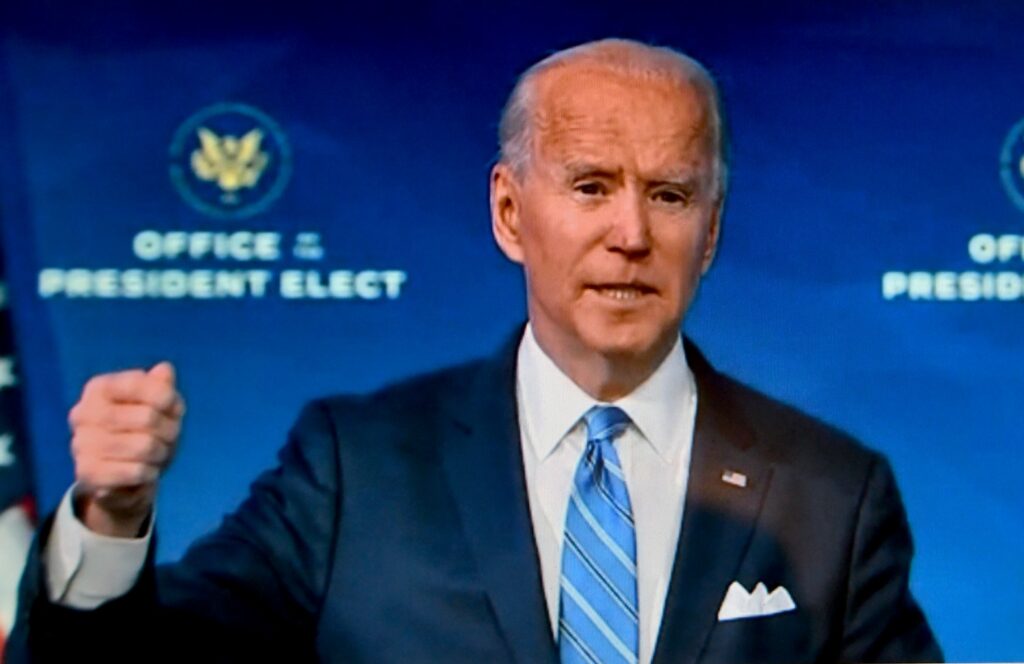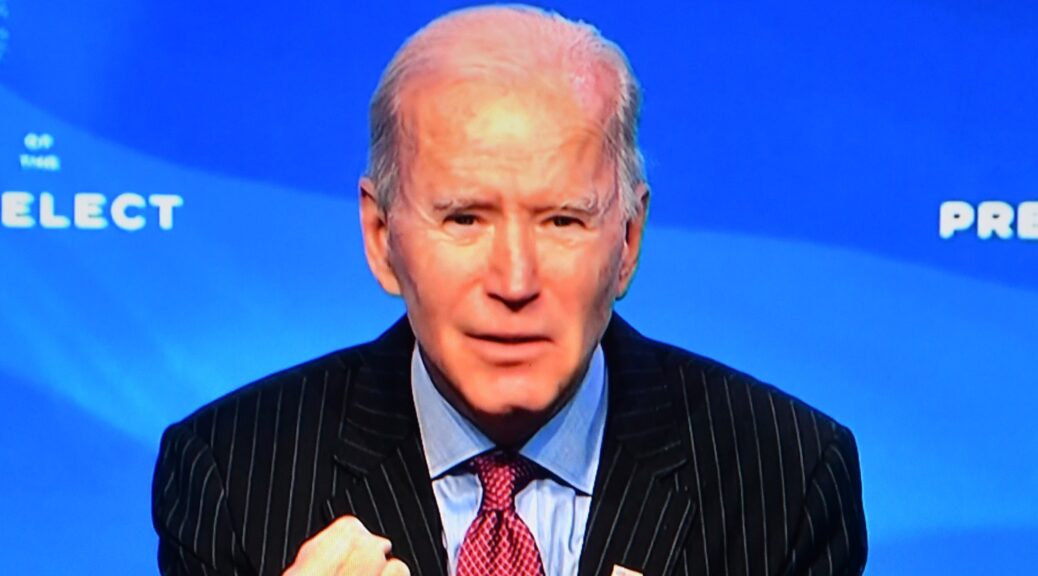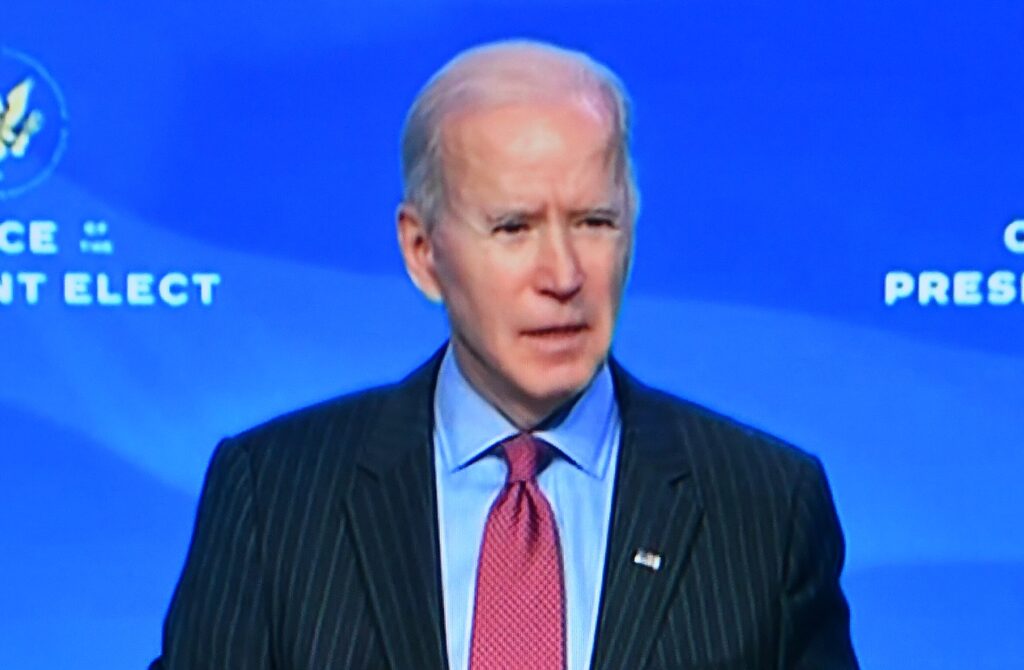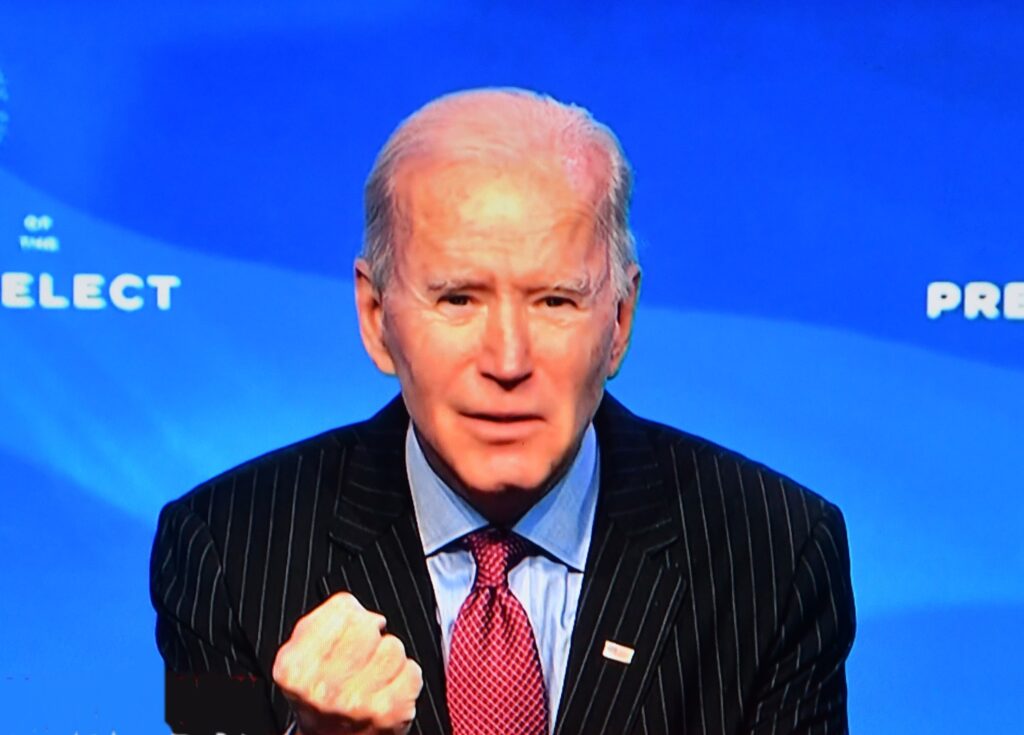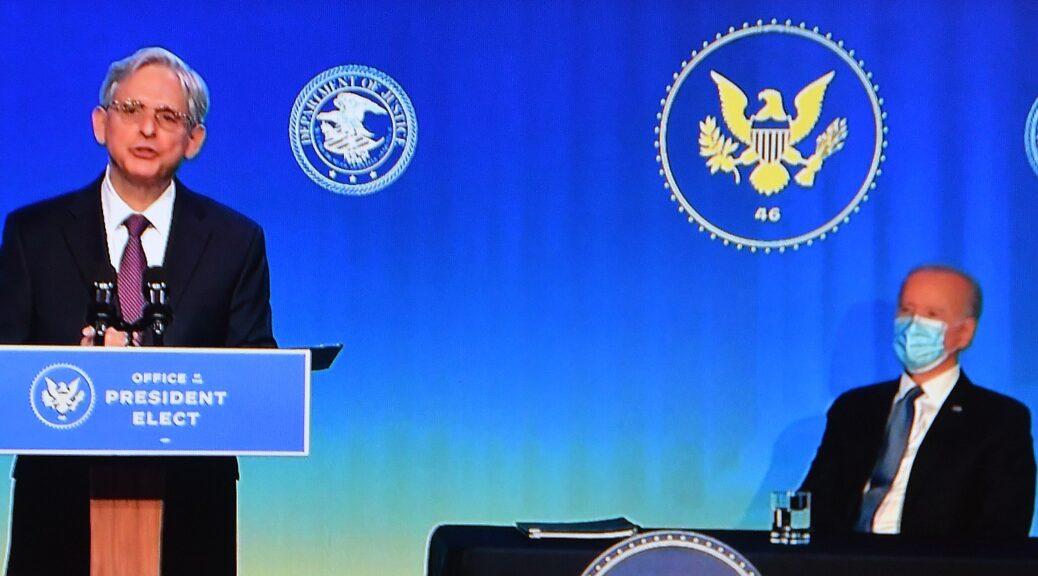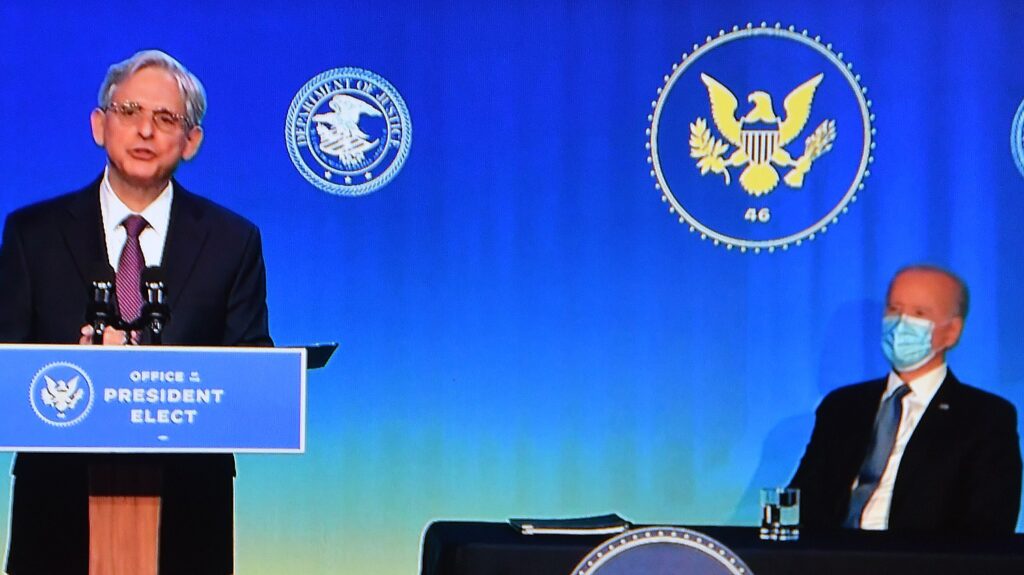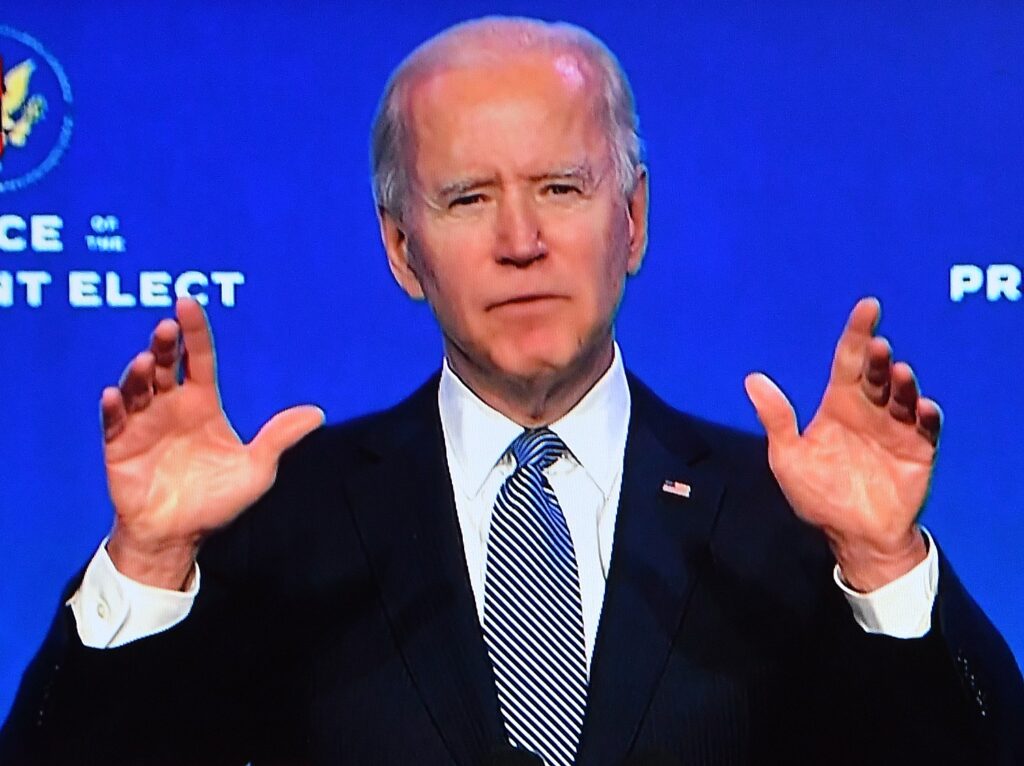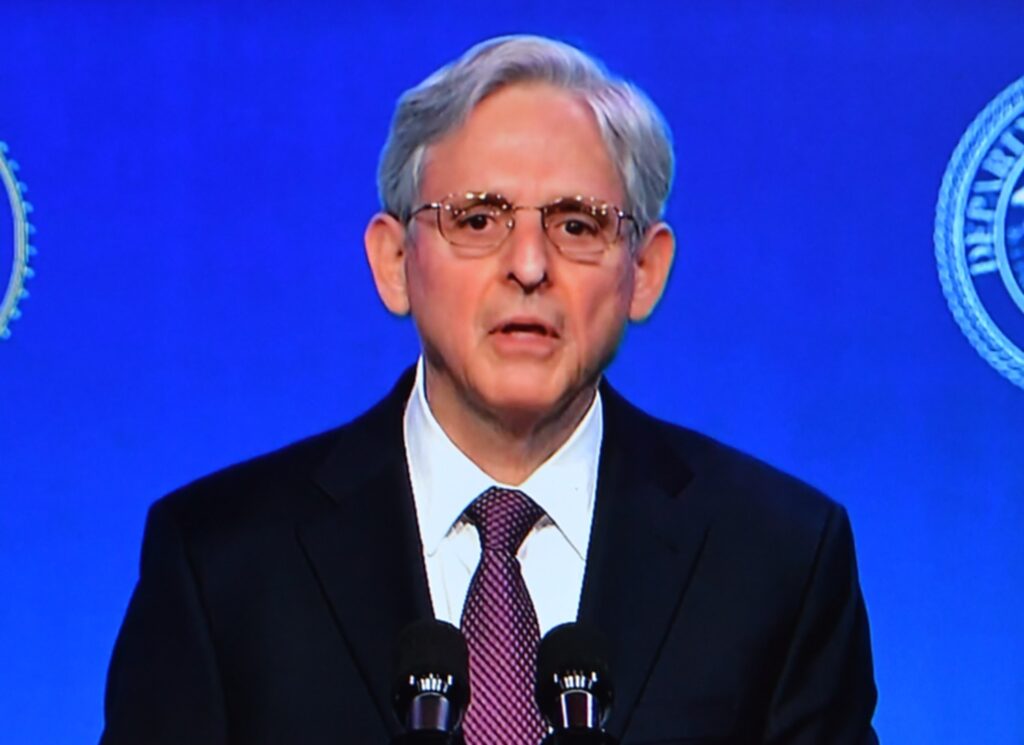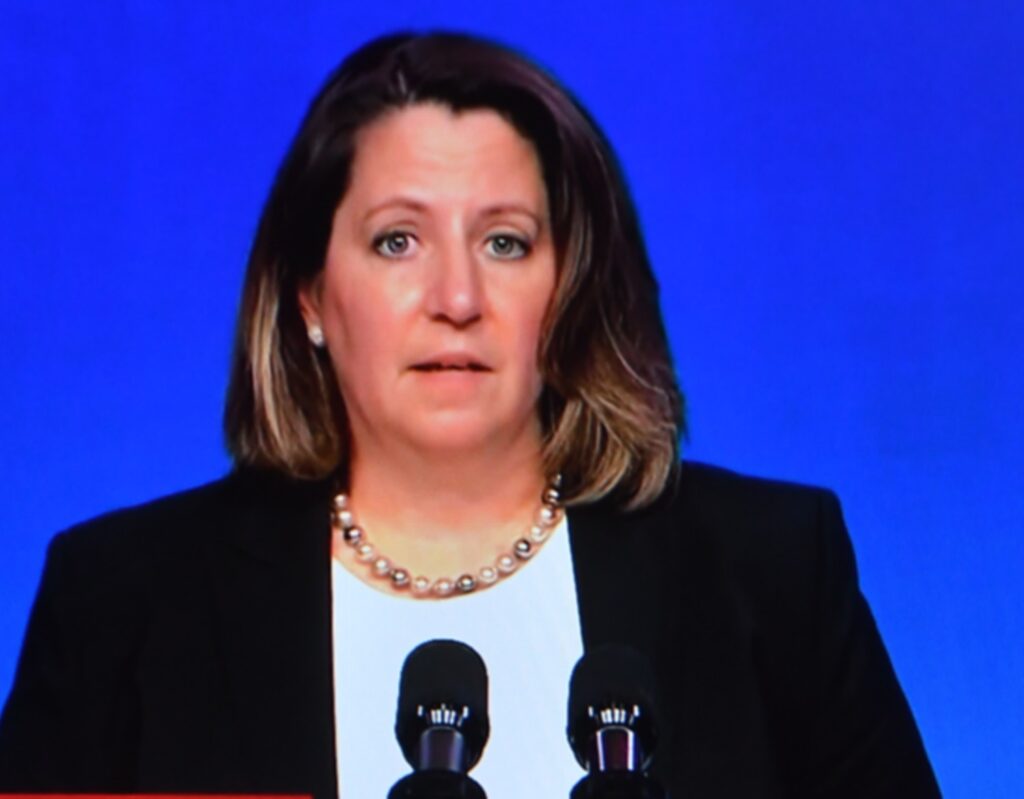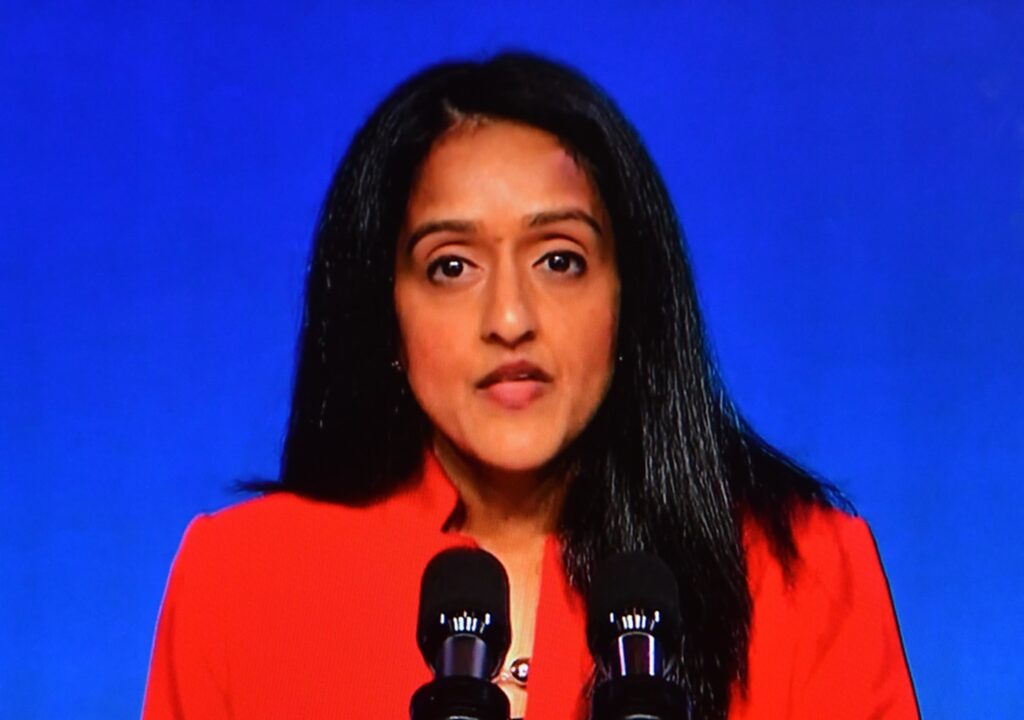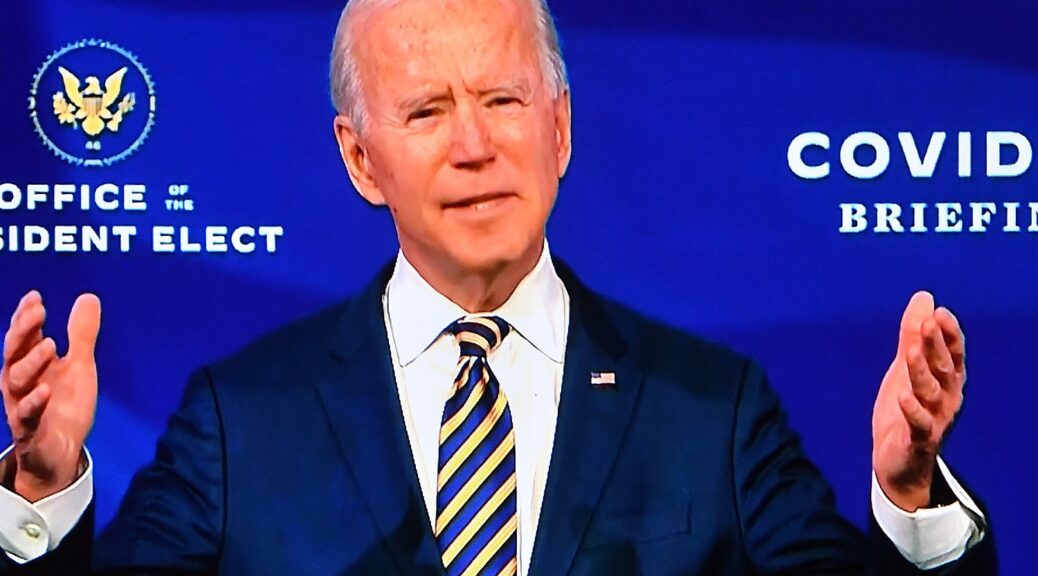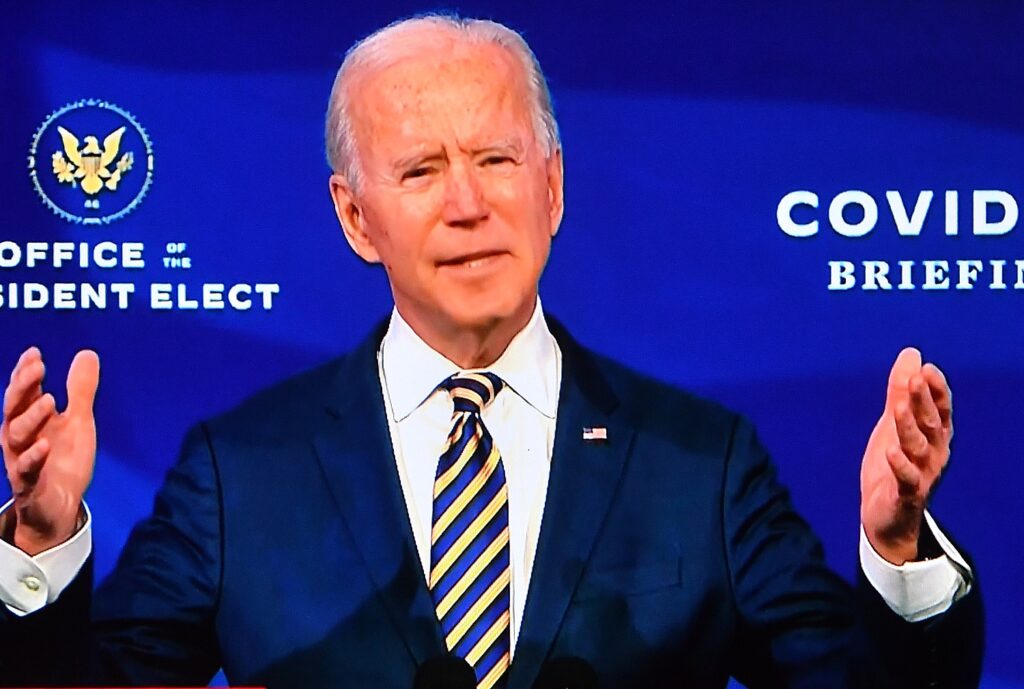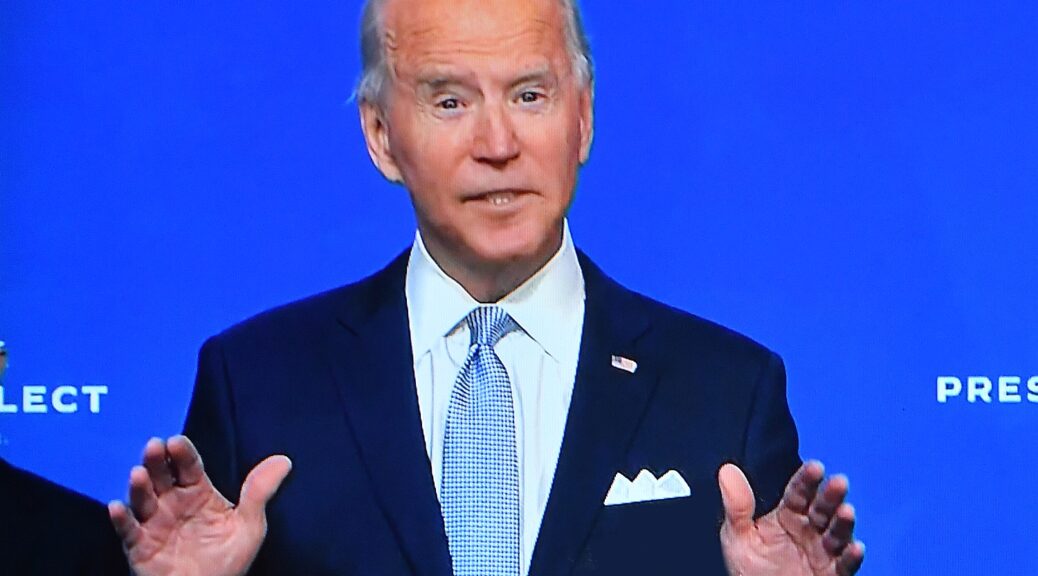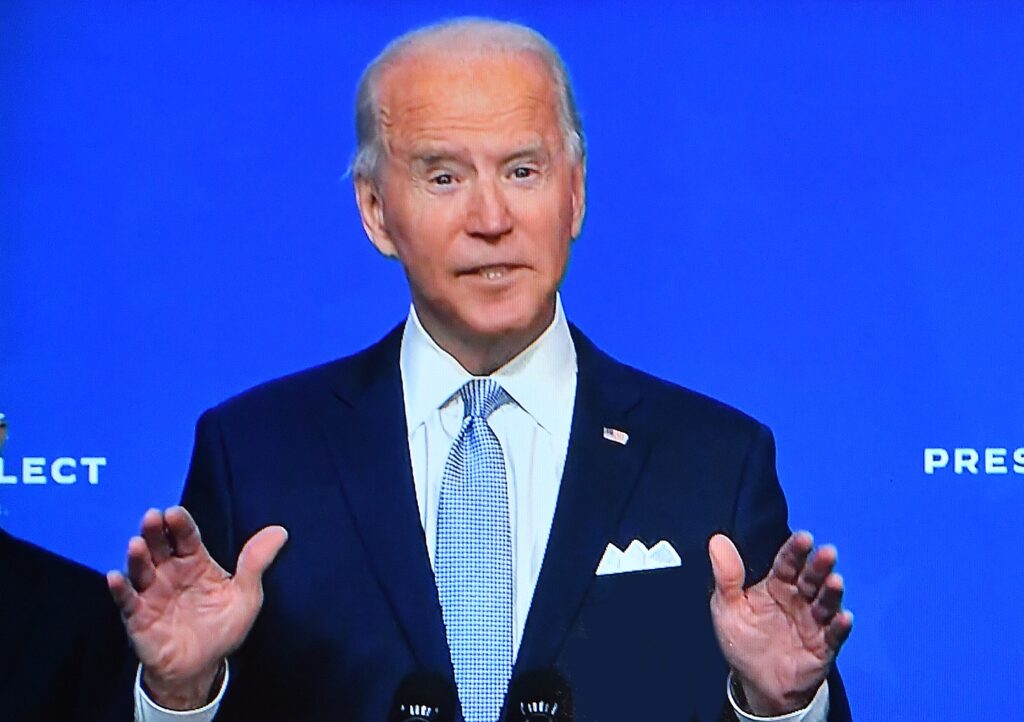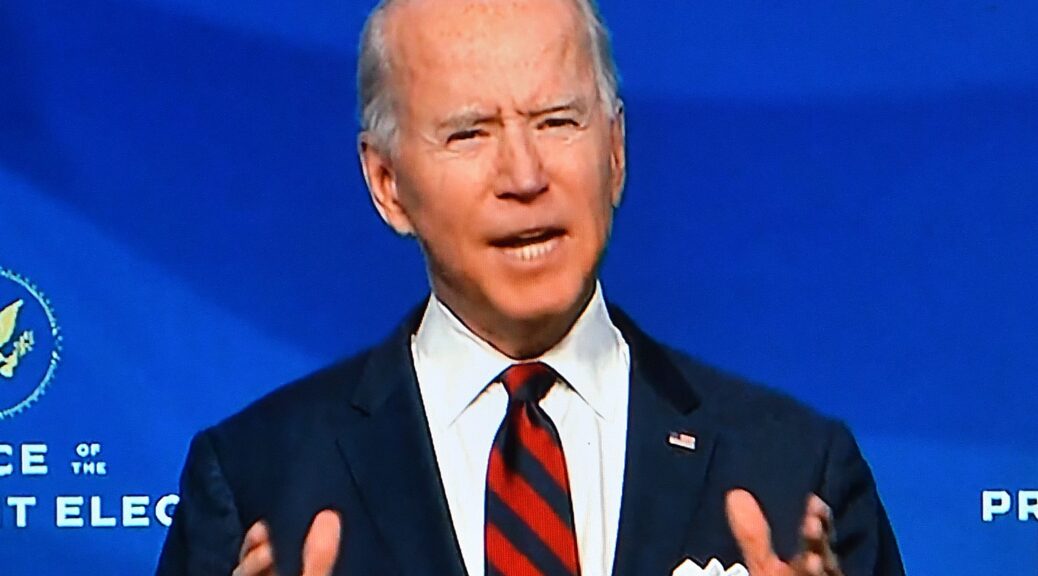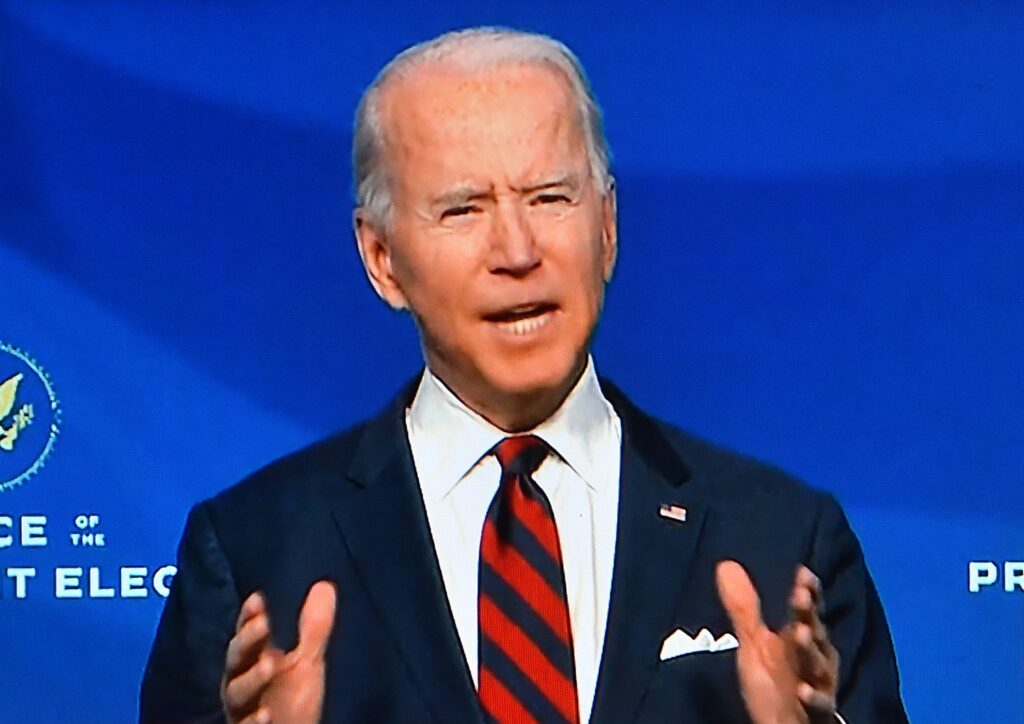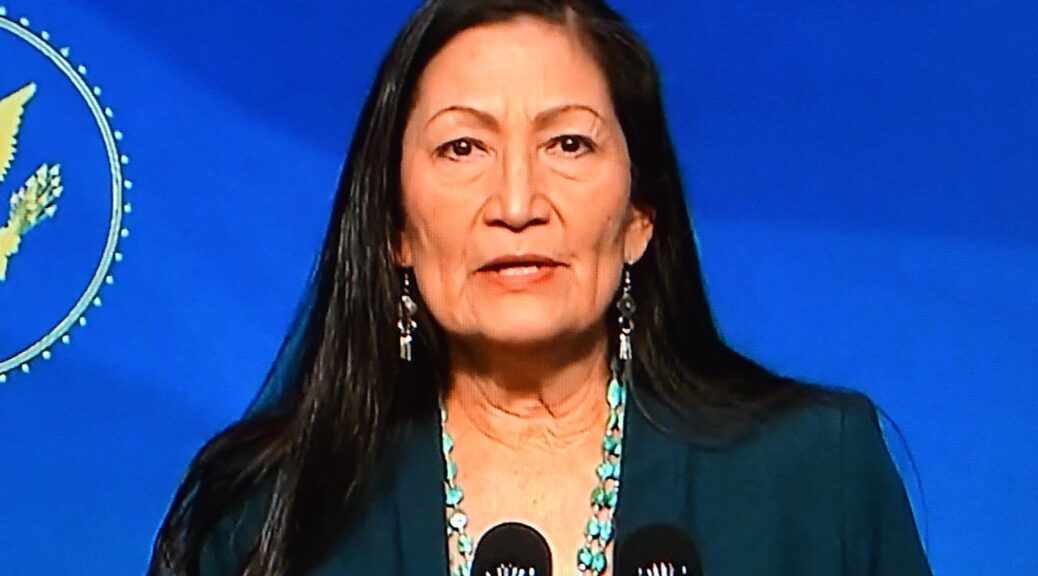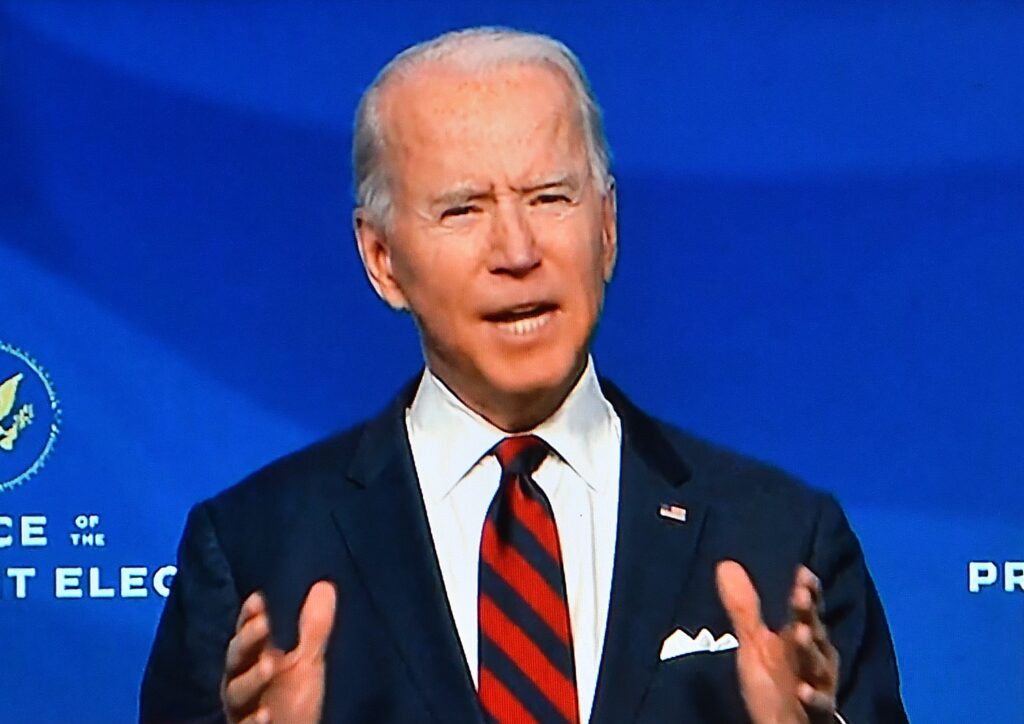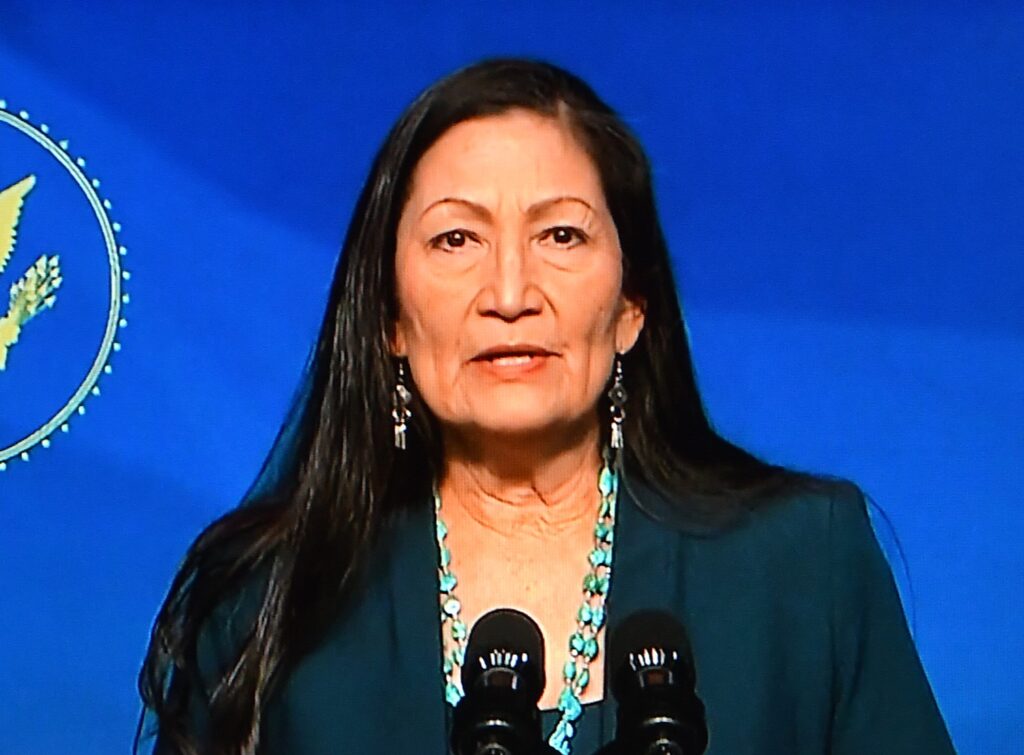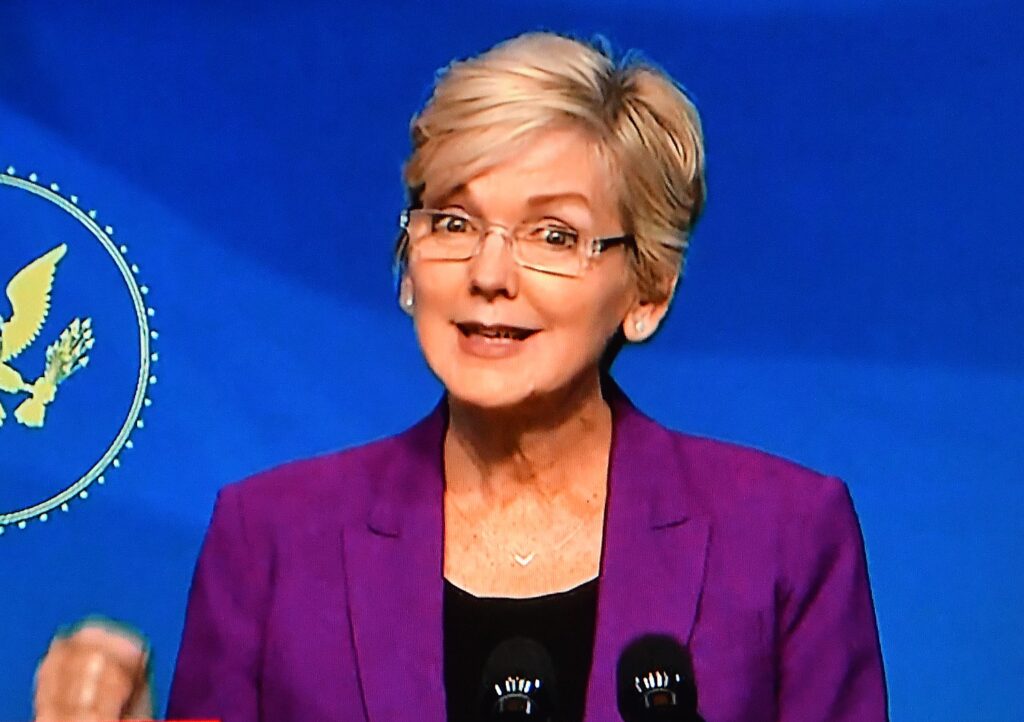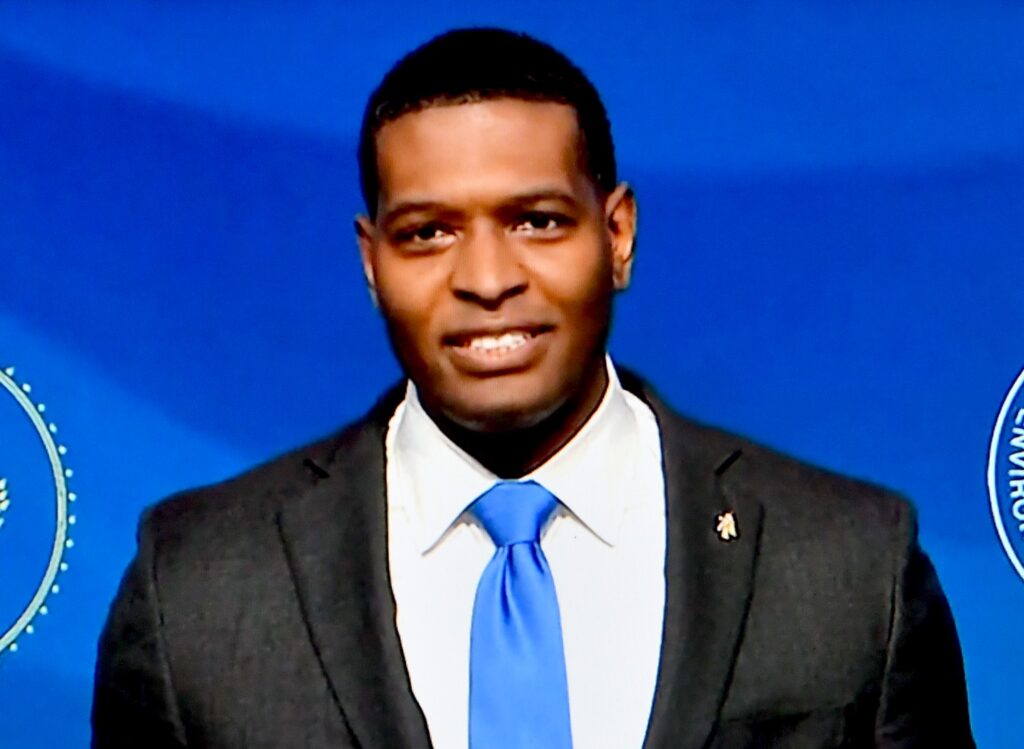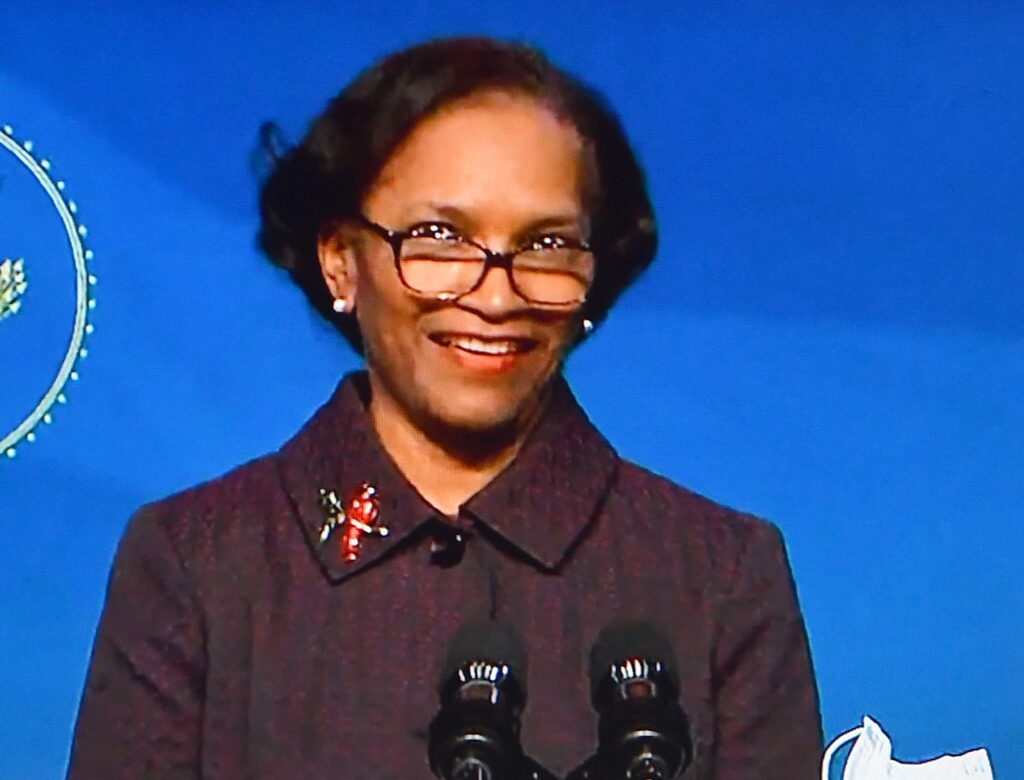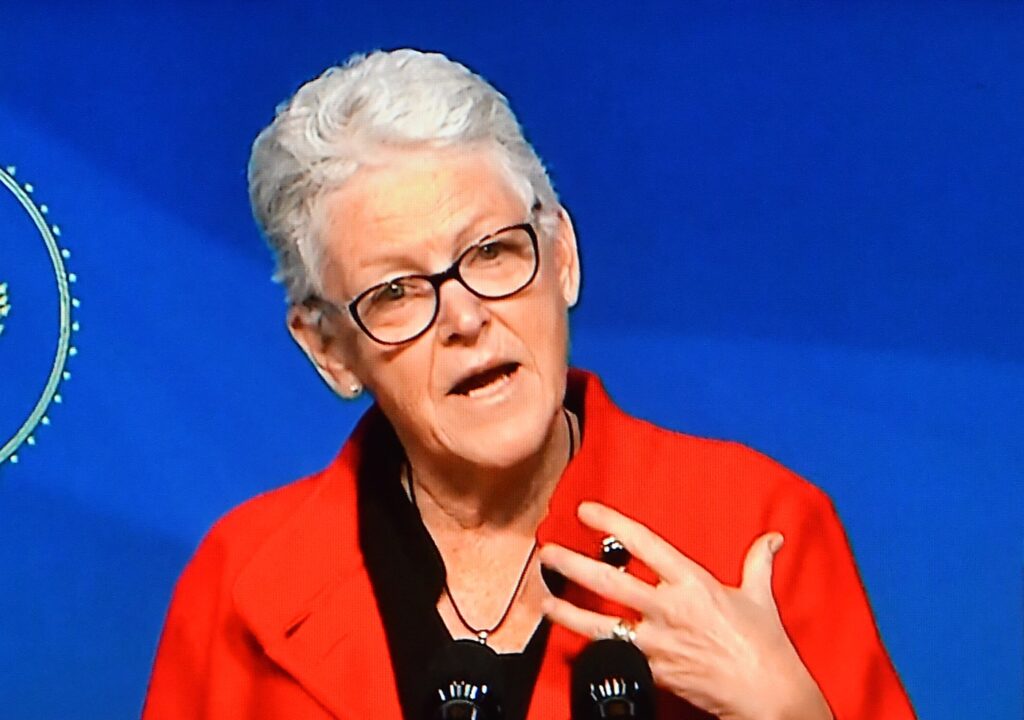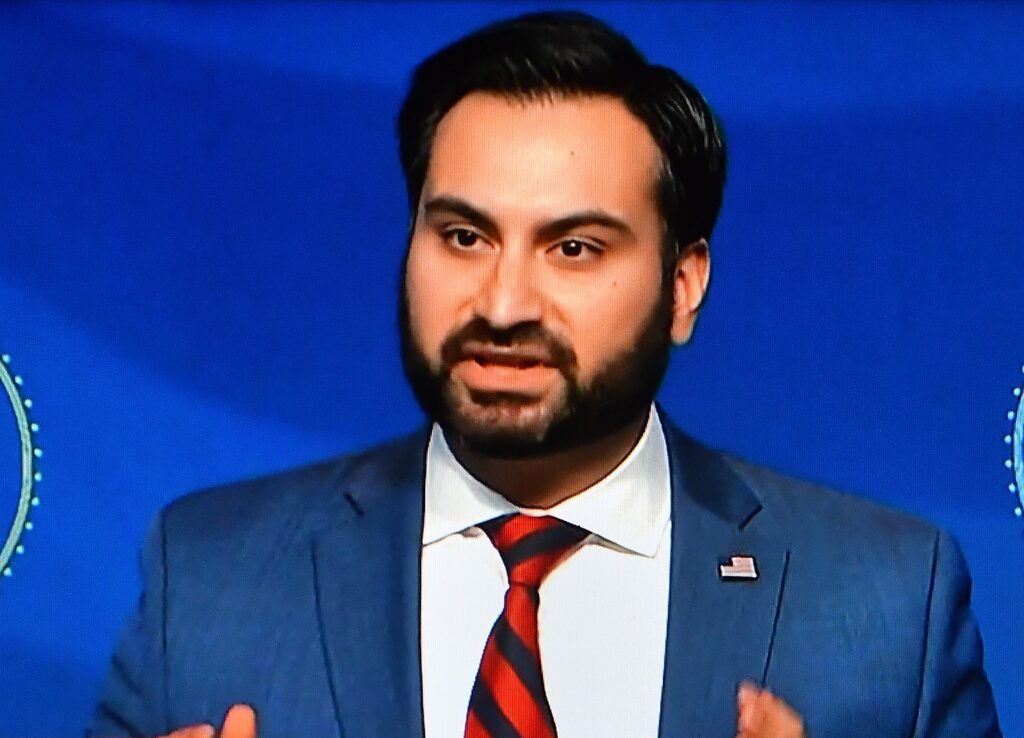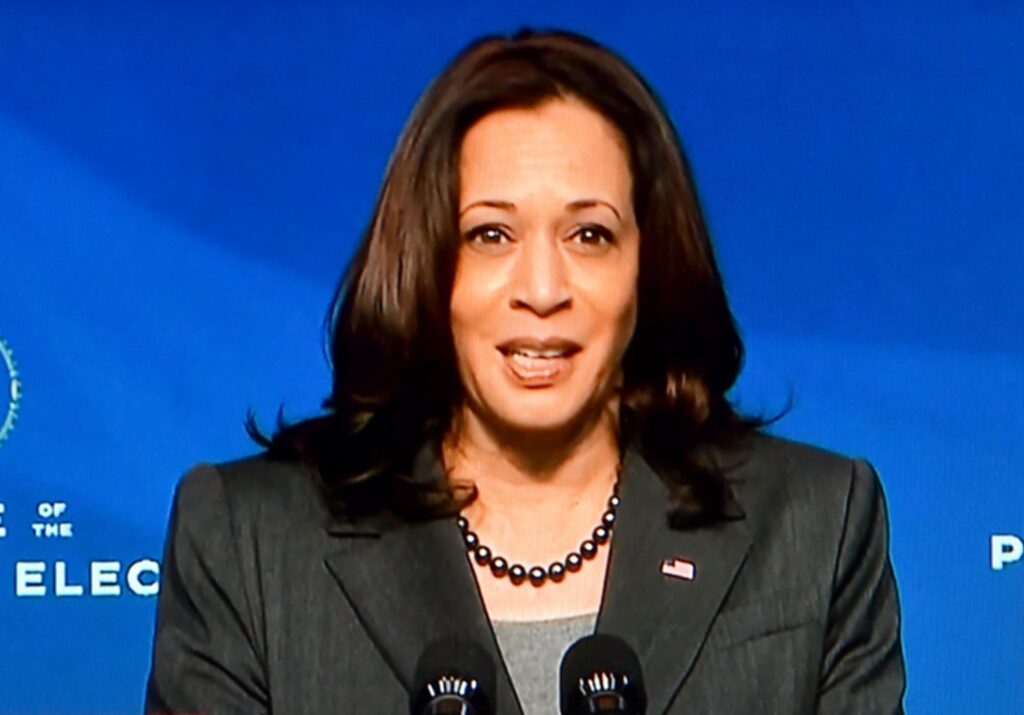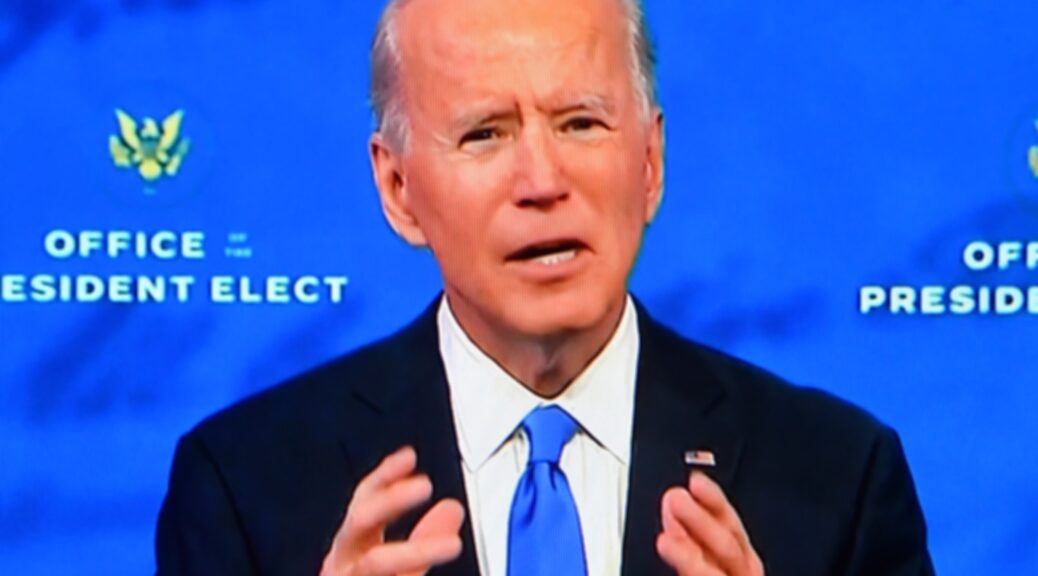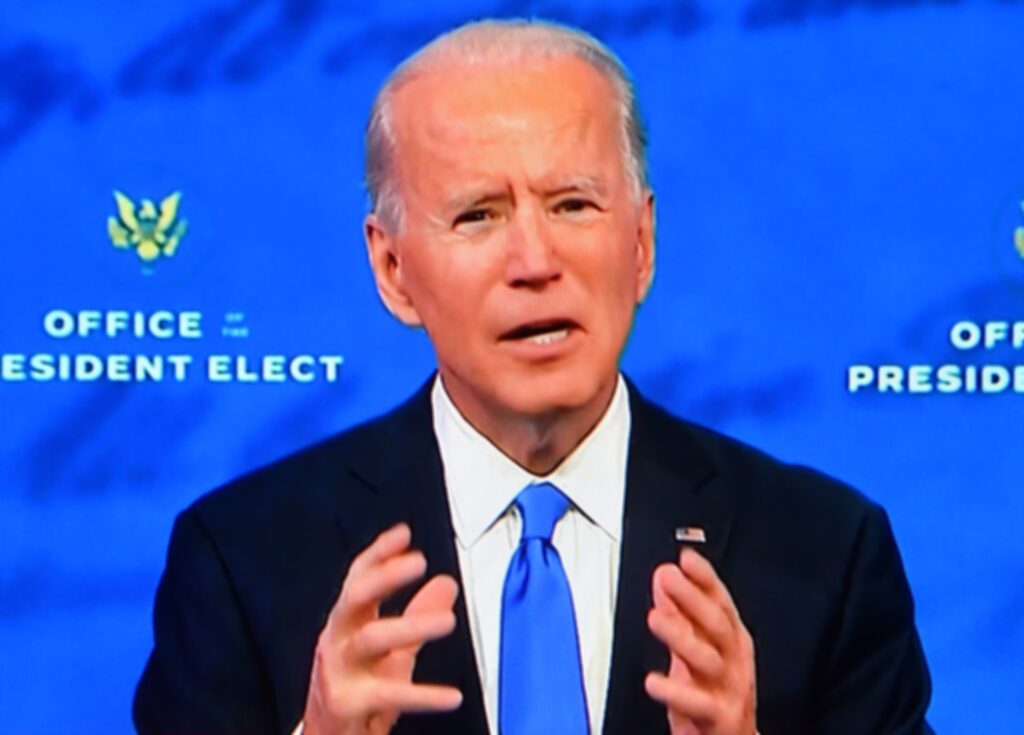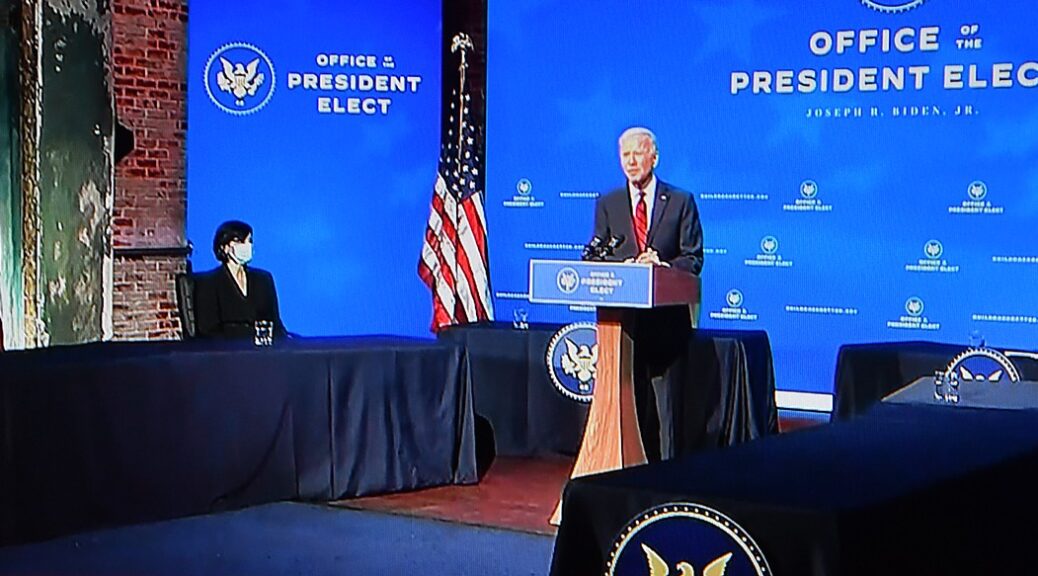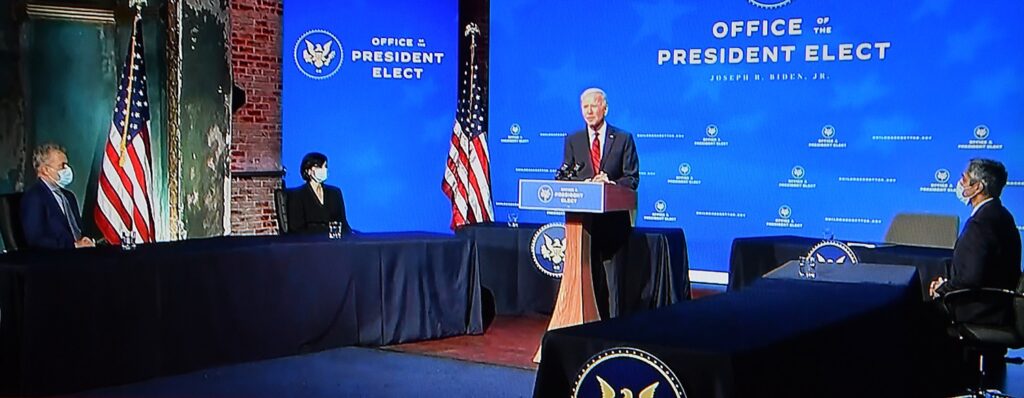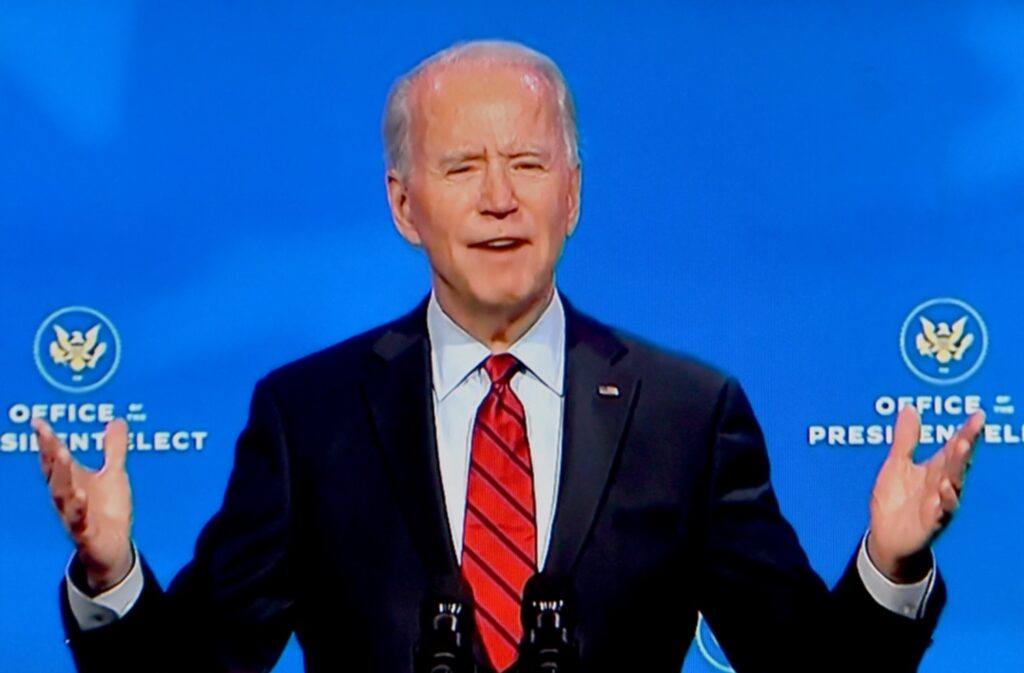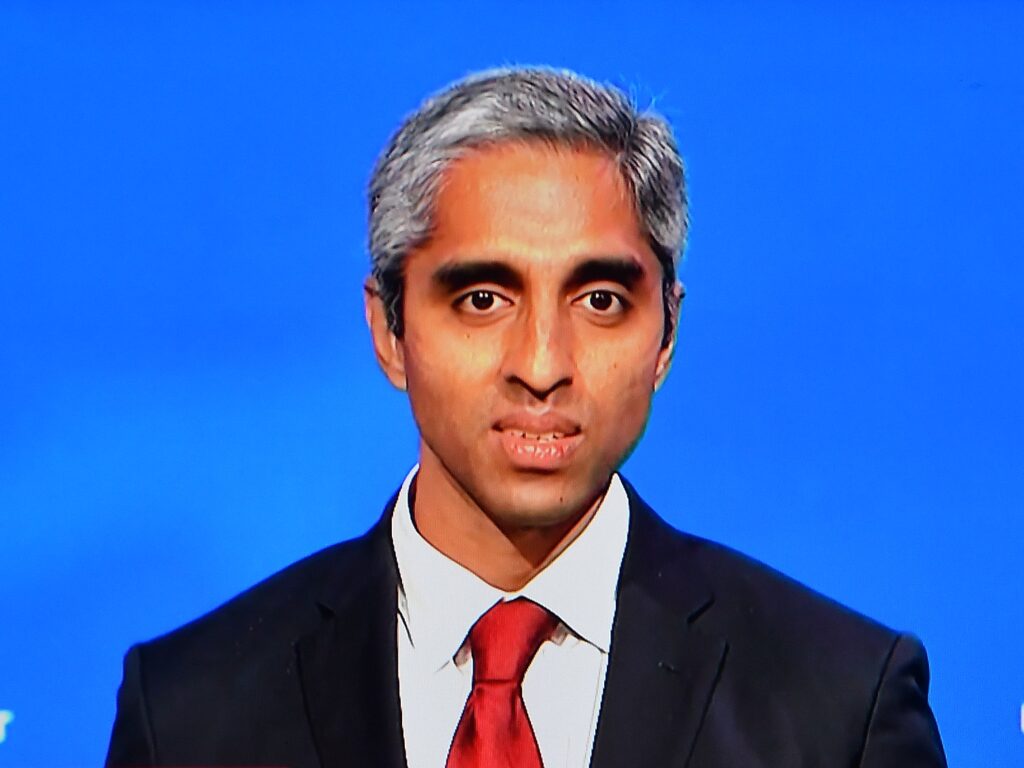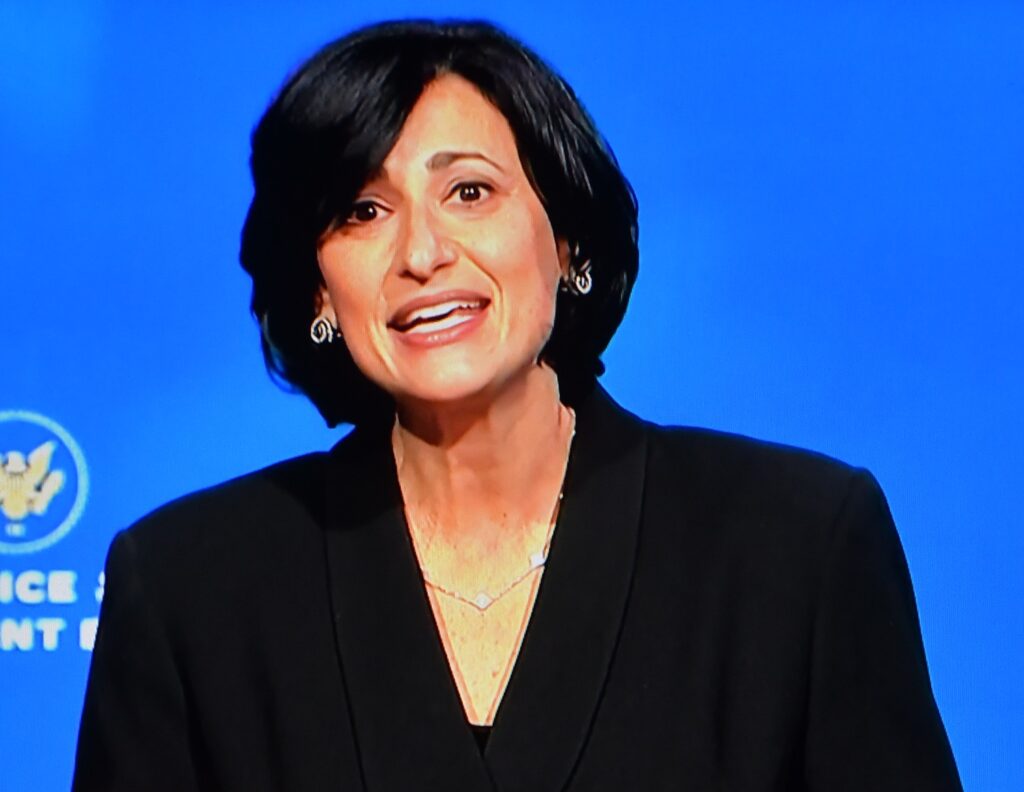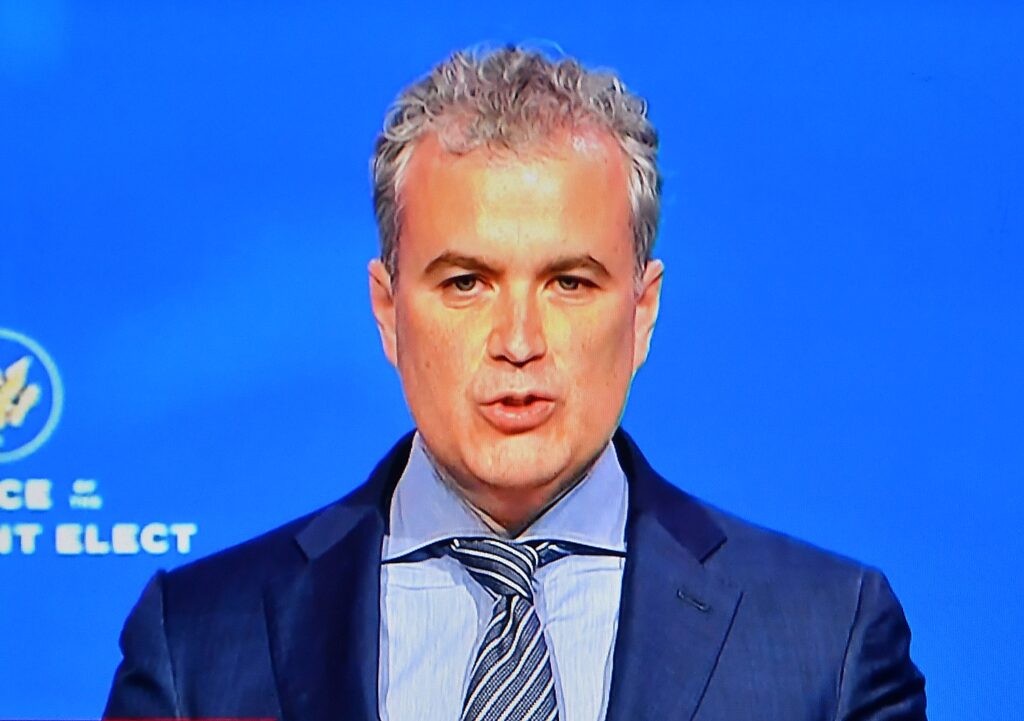Emergency Legislative Package to Fund Vaccinations, Provide Immediate, Direct Relief to Families Bearing the Brunt of the COVID-19 Crisis, and Support Struggling Communities
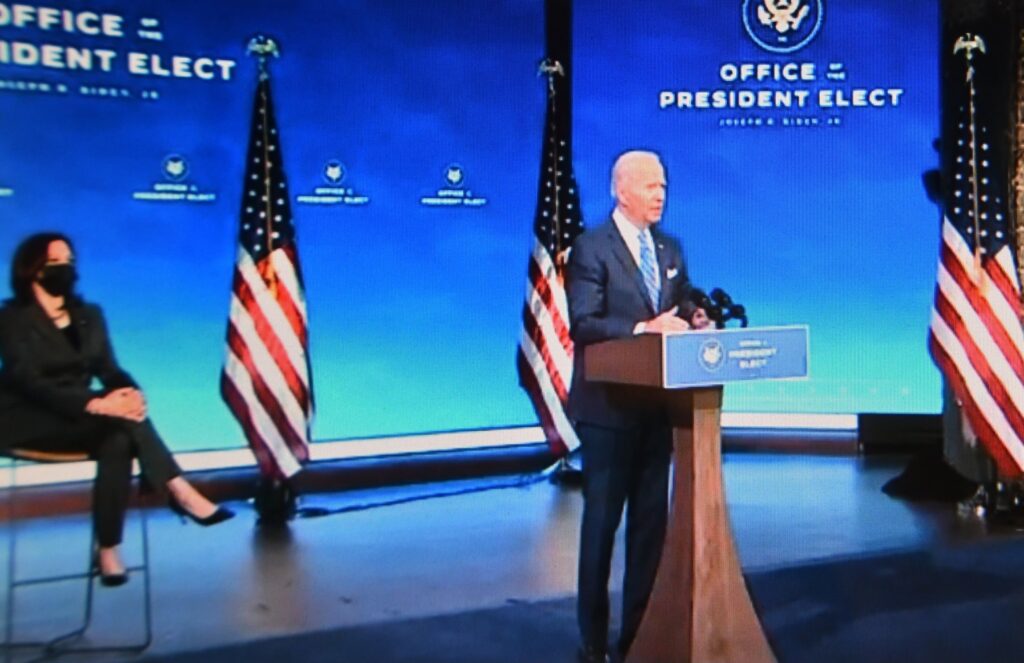
The COVID-19 pandemic and the corresponding economic crisis are devastating families across the country. More than 20 million Americans have contracted COVID-19, and at least 370,000 have died. From big cities to small towns, too many Americans are barely scraping by, or not scraping by at all. And the pandemic has shined a light on the persistence of racial injustice in our healthcare system and our economy. The need to act is clear in the lines at food banks, the small businesses that are closed or closing, and the growing number of Americans experiencing housing insecurity. After nearly a year of the public health crisis, our nation remains in this dark winter of the pandemic and facing a deep economic crisis.
President-elect Biden is laying out the first step of an aggressive, two-step plan for rescue, from the depths of this crisis, and recovery, by investing in America, creating millions of additional good-paying jobs, combatting the climate crisis, advancing racial equity, and building back better than before.
While Congress’s bipartisan action in December was a step in the right direction, it was only a down payment. It fell far short of the resources needed to tackle the immediate crisis. We are in a race against time, and absent additional government assistance, the economic and public health crises could worsen in the months ahead; schools will not be able to safely reopen; and vaccinations will remain far too slow.
As last month’s jobs report underscored, the virus and our economy are intertwined. We cannot rescue our economy without containing this virus.
Today, President-elect Biden is announcing the American Rescue Plan to change the course of the pandemic, build a bridge towards economic recovery, and invest in racial justice. The American Rescue Plan will address the stark, intergenerational inequities that have worsened in the wake of COVID-19. Researchers at Columbia University estimate that these proposals will cut child poverty in half.
Specifically, President-elect Biden’s American Rescue Plan will:
- Mount a national vaccination program, contain COVID-19, and safely reopen schools, including by setting up community vaccination sites nationwide, scaling up testing and tracing, eliminating supply shortage problems, investing in high-quality treatments, providing paid sick leave to contain spread of the virus, addressing health disparities, and making the necessary investments to meet the president-elect’s goal of safely reopening a majority of K-8 schools in the first 100 days.
- Deliver immediate relief to working families bearing the brunt of this crisis by sending $1,400 per-person checks to households across America, providing direct housing and nutrition assistance, expanding access to safe and reliable childcare and affordable healthcare, increasing the minimum wage, extending unemployment insurance, and giving families with kids and childless workers an emergency boost this year.
- Support communities that are struggling in the wake of COVID-19 by providing support for the hardest-hit small businesses, especially small businesses owned by entrepreneurs of color, and protecting the jobs of the first responders, transit workers, and other essential workers we depend on.
In addition to addressing the public health and economic crises head on, the president-elect’s plan will provide emergency funding to upgrade federal information technology infrastructure and address the recent breaches of federal government data systems. This is an urgent national security issue that cannot wait.
President-elect Biden’s $1.9 trillion American Rescue Plan is ambitious, but achievable, and will rescue the American economy and start beating the virus. Congress should act expeditiously to help working families, communities, and small businesses persevere through the pandemic.
This legislative package is needed now to address the immediate crises. In the coming weeks, President-elect Biden will lay out his economic recovery plan to invest in America, create millions of additional good-paying jobs, combat the climate crisis, and build back better than before.
Mount a national vaccination program, contain COVID-19, and safely reopen schools
The pandemic is raging, with record high infection and death rates. A new strain of the virus that is even more contagious is appearing in communities across the country. Meanwhile, Americans are waiting to get their vaccines, even while doses are sitting on shelves. More than ten months into the pandemic, we still lack necessary testing capacity and are suffering from shortages of supplies like basic protective equipment for those on the front lines. Americans of color are being infected and are dying from COVID-19 at greater rates because of lasting systemic racism in our health care system. And, older Americans continue to suffer at disproportionate rates.
We can’t wait to slow the spread of this virus. And, we can’t fight this pandemic in fits and starts. President-elect Biden is putting forward a comprehensive plan to deal with this crisis and launch a whole-of-government COVID-19 response plan that will change the course of the pandemic by ensuring we have necessary supplies and protective gear, increasing testing to mitigate spread, vaccinating the US population, safely reopening schools, and addressing COVID-19 health disparities.
To support this plan, President-elect Biden is calling on Congress to provide the $160 billion in funding necessary to save American lives and execute on his plan to mount a national vaccination program, expand testing, mobilize a public health jobs program, and take other necessary steps to build capacity to fight the virus. He is also calling on Congress to ensure our schools have everything they need to safely reopen and to provide emergency paid leave so people can stay home when needed to help contain the spread of the virus. Altogether, this would put over $400 billion toward these critical measures for addressing COVID-19.
President-elect Biden’s rescue proposal will:
Mount a national vaccination program. Current vaccination efforts are not sufficient to quickly and equitably vaccinate the vast majority of the U.S. population. We must ensure that those on the ground have what they need to get vaccinations into people’s arms. The president-elect’s proposal will invest $20 billion in a national vaccination program in partnership with states, localities, Tribes and territories. This will include launching community vaccination centers around the country and deploying mobile vaccination units to hard-to-reach areas. The Biden Administration will take action to ensure all people in the United States — regardless of their immigration status — can access the vaccine free-of-charge and without cost-sharing. To help states ensure that all Medicaid enrollees will be vaccinated, President-elect Biden will also work with Congress to expand the Federal Medicaid Assistance Percentage (FMAP) to 100% for the administration of vaccines.
Scale up testing to stop the spread of COVID, safely reopen schools, and protect at-risk populations. While we are working to vaccinate the population, we need to focus on what we know works. Testing is a critical strategy for controlling the spread of COVID-19, yet the U.S. is still not using it effectively. Despite innovations to improve testing, tests are still not widely available. The president-elect’s plan invests $50 billion in a massive expansion of testing, providing funds for the purchase of rapid tests, investments to expand lab capacity, and support to help schools and local governments implement regular testing protocols. Expanded testing will ensure that schools can implement regular testing to support safe reopening; that vulnerable settings like prisons and long-term care facilities can regularly test their populations; and that any American can get a test for free when they need one.
Mobilize a public health jobs program to support COVID-19 response. The president-elect’s plan includes an historic investment in expanding the public health workforce. This proposal will fund 100,000 public health workers, nearly tripling the country’s community health roles. These individuals will be hired to work in their local communities to perform vital tasks like vaccine outreach and contact tracing in the near term, and to transition into community health roles to build our long-term public health capacity that will help improve quality of care and reduce hospitalization for low-income and underserved communities.
Address health disparities and COVID-19. While COVID-19 has devastated the entire country, it has hit some groups and communities of color much harder than others. President-elect Biden is committed to addressing the disparities evident in the pandemic at every step, from ensuring equitable distribution of vaccines and supplies to expanding health care services for underserved communities. His proposal includes funding to provide health services for underserved populations, including expanding Community Health Centers and investing in health services on tribal lands. These funds will support the expansion of COVID treatment and care, as well as our ability to provide vaccination to underserved populations.
Protect vulnerable populations in congregate settings. Long-term care residents and workers account for almost 40% of all U.S. COVID-19 deaths. Further, African-American and Latina women, who have borne the brunt of the pandemic, are overrepresented among long-term care workers. The president-elect’s proposal provides critical funding for states to deploy strike teams to long-term care facilities experiencing COVID-19 outbreaks — which may impede vaccination of residents and workers — and to conduct better infection control oversight.
1 in 5 state and federal prisoners in the U.S. has had COVID-19, and African Americans and Latinos are overrepresented among incarcerated individuals. The proposal also supports COVID-19 safety in federal, state, and local prisons, jails, and detention centers by providing funding for COVID-19 mitigation strategies, including supplies and physical distancing; safe re-entry for the formerly incarcerated; and the vaccination of both incarcerated people and staff.
Identify and address emerging strains of COVID-19. The identification of new strains of SARS-CoV-2 in the United Kingdom and South Africa highlight a key vulnerability in our nation’s COVID response: we simply do not have the kind of robust surveillance capabilities that we need to track outbreaks and mutations. Tracking the way the virus is changing and moving through the population is essential to understanding outbreaks, generating treatments and vaccines, and controlling the pandemic. The president-elect’s proposal includes funding to dramatically increase our country’s sequencing, surveillance, and outbreak analytics capacity at the levels demanded by the crisis.
Provide emergency relief and purchase critical supplies and deploy National Guard. Persistent supply shortages — from gloves and masks to glass vials and test reagents — are inhibiting our ability to provide testing and vaccination and putting frontline workers at risk. The president-elect’s plan will invest $30 billion into the Disaster Relief Fund to ensure sufficient supplies and protective gear, and to provide 100% federal reimbursement for critical emergency response resources to states, local governments, and Tribes, including deployment of the National Guard. The president-elect will call for an additional $10 billion investment in expanding domestic manufacturing for pandemic supplies. These funds will support President-elect Biden in fulfilling his commitment to fully use the Defense Production Act and to safeguard the country by producing more pandemic supplies in the U.S.
Invest in treatments for COVID-19. Months into this pandemic, we still do not have reliable and accessible treatments. The federal government urgently needs to invest to support development, manufacturing, and purchase of therapies to ensure wide availability and affordability of effective treatments, as well as invest in studies of the long-term health impacts of COVID-19 and potential therapies to address them.
Protect workers against COVID-19. Millions of Americans, many of whom are people of color, immigrants, and low-wage workers, continue to put their lives on the line to keep the country functioning through the pandemic. They should not have to lie awake at night wondering if they’ll make it home from work safely the next day, or if they’ll bring home the virus to their loved ones and communities. The president-elect is calling on Congress to authorize the Occupational Safety and Health Administration to issue a COVID-19 Protection Standard that covers a broad set of workers, so that workers not typically covered by OSHA, like many public workers on the frontlines, also receive protection from unsafe working conditions and retaliation. And, President-elect Biden is calling on Congress to provide additional funding for OSHA enforcement and grant funding, including for the Susan Harwood grant program, for organizations to help keep vulnerable workers healthy and safe from COVID-19. These steps will help keep more workers healthy, reopen more businesses safely, and beat the virus.
Restore U.S. leadership globally and build better preparedness. Protecting the United States from COVID-19 requires a global response, and the pandemic is a grave reminder that biological threats can pose catastrophic consequences to the United States and the world. The president-elect’s plan will provide support to the international health and humanitarian response; mitigate the pandemic’s devastating impact on global health, food security, and gender-based violence; support international efforts to develop and distribute medical countermeasures for COVID-19; and build the capacity required to fight COVID-19, its variants, and emerging biological threats.
Provide schools the resources they need to reopen safely. A critical plank of President-elect Biden’s COVID-19 plan is to safely reopen schools as soon as possible — so kids and educators can get back in class and parents can go back to work. This will require immediate, urgent action by Congress. The COVID-19 pandemic created unprecedented challenges for K-12 schools and institutions of higher education, and the students and parents they serve. School closures have disproportionately impacted the learning of Black and Hispanic students, as well as students with disabilities and English language learners. While the December down payment for schools and higher education institutions was a start, it is not sufficient to address the crisis. President-elect Biden is calling on Congress to provide $170 billion — supplemented by additional state and local relief resources — for K-12 schools and institutions of higher education. These resources will help schools serve all students, no matter where they are learning, and help achieve President-elect Biden’s goal to open the majority of K-8 schools within the first 100 days of his Administration.
- Provide $130 billion to help schools to safely reopen. Schools need flexible resources to safely reopen and operate and/or facilitate remote learning. The president-elect’s plan will provide $130 billion to support schools in safely reopening. These funds can be used to reduce class sizes and modify spaces so students and teachers can socially distance; improve ventilation; hire more janitors and implement mitigation measures; provide personal protective equipment; ensure every school has access to a nurse; increase transportation capacity to facilitate social distancing on the bus; hire counselors to support students as they transition back to the classroom; close the digital divide that is exacerbating inequities during the pandemic; provide summer school or other support for students that will help make up lost learning time this year; create and expand community schools; and cover other costs needed to support safely reopening and support students. These funds will also include provisions to ensure states adequately fund education and protect students in low-income communities that have been hardest hit by COVID-19. Districts must ensure that funds are used to not only reopen schools, but also to meet students’ academic, mental health and social, and emotional needs in response to COVID-19, (e.g. through extended learning time, tutoring, and counselors), wherever they are learning. Funding can be used to prevent cuts to state pre-K programs. A portion of funding will be reserved for a COVID-19 Educational Equity Challenge Grant, which will support state, local and tribal governments in partnering with teachers, parents, and other stakeholders to advance equity- and evidence-based policies to respond to COVID-related educational challenges and give all students the support they need to succeed. In addition to this funding, schools will be able to access FEMA Disaster Relief Fund resources to get reimbursed for certain COVID-19 related expenses and will receive support to implement regular testing protocols.
- Expand the Higher Education Emergency Relief Fund. The president-elect’s plan will ensure colleges have critical resources to implement public health protocols, execute distance learning plans, and provide emergency grants to students in need. This $35 billion in funding will be directed to public institutions, including community colleges, as well as, public and private Historically Black Colleges and Universities and other Minority Serving Institutions. This funding will provide millions of students up to an additional $1,700 in financial assistance from their college.
- Hardest Hit Education Fund. Provide $5 billion in funds for governors to use to support educational programs and the learning needs of students significantly impacted by COVID-19, whether K-12, higher education, or early childhood education programs.
Provide emergency paid leave to 106 million more Americans to reduce the spread of the virus. No American should have to choose between putting food on the table and quarantining to prevent further spread of COVID-19. And yet, nearly 1 in 4 workers and close to half of low-income workers lack access to paid sick leave, disproportionately burdening Americans of color. Lack of paid leave is threatening the financial security of working families and increasing the risk of COVID-19 infections, hospitalizations, and deaths. Congress did the right thing last year when it created an emergency paid leave program through the Families First Coronavirus Response Act. That action decreased daily infections by 400 cases per state per day in states that previously had no paid sick leave requirement. While the December down payment extended the Families First employer tax credits through March 2021, it did not renew the requirement that employers provide leave. President-elect Biden is calling on Congress to:
- Put the requirement back in place and eliminate exemptions for employers with more than 500 and less than 50 employees. He will also make it clear that healthcare workers and first responders get these benefits, too. Closing these loopholes in the Families First Coronavirus Response Act will extend emergency paid leave to up to 106 million additional workers.
- Provide expanded paid sick and family and medical leave. The president-elect will provide over 14 weeks of paid sick and family and medical leave to help parents with additional caregiving responsibilities when a child or loved one’s school or care center is closed; for people who have or are caring for people with COVID-19 symptoms, or who are quarantining due to exposure; and for people needing to take time to get the vaccine.
- Expand emergency paid leave to include federal workers. This measure will provide paid leave protections to approximately 2 million Americans who work for the federal government.
- Provide a maximum paid leave benefit of $1,400 per-week for eligible workers. This will provide full wage replacement to workers earning up to $73,000 annually, more than three-quarters of all workers.
- Reimburse employers with less than 500 employees for the cost of this leave. Extending the refundable tax credit will reimburse employers for 100 percent of the cost of this leave.
- Reimburse state and local government for the cost of this leave.
- Extend emergency paid leave measures until September 30, 2021. With so much uncertainty surrounding the pandemic, extending paid leave until the end of September will help to limit the spread of COVID-19 and provide economic security to millions of working families.
Deliver Immediate, Direct Relief to Families Bearing the Brunt of the Crisis.
As a result of the COVID-19 crisis, millions of Americans are hurting through no fault of their own. More than 10 million Americans are unemployed, and 4 million have been out of work for half a year or longer. The jobs crisis is particularly severe in communities of color, where 1 in 10 Black workers and 1 in 11 Latino workers are unemployed. Large numbers of families are struggling to pay rent or their mortgages and put food on the table. And, last month, it only got worse: we lost 140,000 jobs in December, including 20,000 public educators, and nearly 400,000 jobs at restaurants and bars.
President-elect Biden is calling on Congress to take urgent action to deliver immediate, direct relief to Americans bearing the brunt of this crisis. Altogether, this would devote about $1 trillion towards building a bridge to economic recovery for working families and, according to researchers at Columbia University, cut child poverty in half.
President-elect Biden’s plan will:
Give working families a $1,400 per-person check to help pay their bills, bringing their total relief payment from this and the December down payment to $2,000. More than 1 in 3 households — and half of Black and Latino households — are struggling to pay for usual household expenses like rent and groceries during the pandemic. In this crisis, working families need more than the $600 per person that Congress passed last year. President-elect Biden is calling on Congress to increase that direct financial assistance to $2,000. An additional $1,400 per person in direct checks will help hard-hit households cover expenses, spend money at local businesses in their communities, and stimulate the economy. President-elect Biden’s plan will also expand eligibility to adult dependents who have been left out of previous rounds of relief and all mixed status households. And, his plan will ensure that the Treasury Department has the flexibility and resources it needs to deliver stimulus checks to the families that need them most, including the millions of families that still haven’t received the $1,200 checks they are entitled to under the CARES Act.
Extend and expand unemployment insurance benefits so American workers can pay their bills. Around 18 million Americans rely on the unemployment insurance program. Congress did the right thing by continuing expanded eligibility and extending the number of weeks unemployed workers can receive benefits. One study estimates that extending pandemic unemployment insurance programs through 2021 could create or save over five million jobs. But these benefits are set to expire in weeks — even as the COVID-19 pandemic worsens. Millions of Americans are receiving benefits through unemployment insurance programs that will no longer serve new beneficiaries starting in mid-March.
President-elect Biden is calling on Congress to extend these and other programs, providing millions of hard-hit workers with the financial security and peace of mind they need and deserve. And, he believes Congress should provide a $400 per-week unemployment insurance supplement to help hard-hit workers cover household expenses. The president-elect is committed to providing these emergency supports to families for as long as the COVID-19 crisis continues and employment opportunities remain limited. The president-elect is proposing to extend these emergency unemployment insurance programs through September 2021, and will work with Congress on ways to automatically adjust the length and amount of relief depending on health and economic conditions so future legislative delay doesn’t undermine the recovery and families’ access to benefits they need.
President-elect Biden’s plan will:
- Extend financial assistance for workers who have exhausted their regular unemployment compensation benefits. Extending and increasing the additional weeks provided under the emergency unemployment insurance program will ensure that approximately 5 million Americans continue to receive assistance in the months ahead.
- Extend financial assistance for unemployed workers who do not typically qualify for unemployment compensation benefits. The president-elect believes Congress should extend unemployment support for self-employed workers, like ride-share drivers and many grocery delivery workers, who do not typically qualify for regular unemployment compensation. And, he supports increasing the number of weeks these workers can receive the benefit to provide long-term financial security to the program’s approximately 8 million beneficiaries.
- Fully fund states’ short-time compensation programs and additional weeks of benefits. Short-time compensation programs, also known as work sharing, help small businesses stay afloat and economically vulnerable workers make ends meet by enabling workers to stay on the job at reduced hours, while making up the difference in pay. These programs avoid layoffs and pave the way for rapid rehiring and an accelerated recovery.
Help struggling households keep a roof over their heads. The economic fallout of COVID-19 has made it more difficult for working families, especially families of color, to cover their housing expenses. Across the country, 1 in 5 renters and 1 in 10 homeowners with a mortgage are behind on payments. Congress took an important step in the right direction by securing $25 billion in rental assistance and extending the federal eviction moratorium until January 31. However, American families already owe $25 billion in back rent, and the threat of widespread evictions will still exist at the end of January. Further, more than 10 million homeowners have fallen behind on mortgage payments. Failing to take additional action will lead to a wave of evictions and foreclosures in the coming months, overwhelming emergency shelter capacity and increasing the likelihood of COVID-19 infections. And Americans of color, who have on average a fraction of the wealth available to white families, face higher risks of eviction and housing loss without critical assistance.
President-elect Biden is calling on Congress to take immediate action to forestall a coming wave of COVID-related evictions and foreclosures.
- Ensure that families hit hard by the economic crisis won’t face eviction or foreclosure. The president-elect is calling on Congress to extend the eviction and foreclosure moratoriums and continue applications for forbearance on federally-guaranteed mortgages until September 30, 2021. These measures will prevent untold economic hardship for homeowners, while limiting the spread of COVID-19 in our communities. The president-elect is also calling on Congress to provide funds for legal assistance for households facing eviction or foreclosure.
- Help renters and small landlords make ends meet by providing an additional $30 billion in rental and critical energy and water assistance for hard-hit individuals and families. While the $25 billion allocated by Congress was an important down payment on the back rent accrued during this crisis, it is insufficient to meet the scale of the need. That’s why President-elect Biden is proposing an additional $25 billion in rental assistance to provide much-needed rental relief, especially for low- and moderate-income households who have lost jobs or are out of the labor market. The president-elect is also proposing $5 billion to cover home energy and water costs and arrears through programs like the Low Income Home Energy Assistance Program, for struggling renters. These funds will ensure that the hardest-hit renters and small landlords, including those in disadvantaged communities that have suffered disproportionately in terms of pollution and other environmental harms, aren’t put in the position where they can’t cover their own housing expenses. This program includes a competitive set-aside of funding for states to invest in clean energy and energy efficiency projects that reduce electricity bills for families in disadvantaged communities.
- Deliver $5 billion in emergency assistance to help secure housing for people experiencing or at risk of homelessness. This funding will allow states and localities to help approximately 200,000 individuals and families obtain stable housing, while providing a downpayment on the president-elect’s comprehensive approach to ending homelessness and making housing a right for all Americans. Specifically, these funds will provide flexibility for both congregate and non-congregate housing options, help jurisdictions purchase and convert hotels and motels into permanent housing, and give homeless services providers the resources they need to hire and retain staff, maintain outreach programs, and provide essential services.
Address the growing hunger crisis in America. About 1 in 7 households nationwide, including more than 1 in 5 Black and Latino households and many Asian American and Pacific Islander households, are struggling to secure the food they need. While the December down payment provided $13 billion to strengthen and expand federal nutrition programs, it will not solve the hunger crisis in America. President-elect Biden is calling on Congress to ensure all Americans, regardless of background, have access to healthy, affordable groceries. The president-elect’s plan will:
- Extend the 15 percent Supplemental Nutrition Assistance Program (SNAP) benefit increase. Maintaining the increase through the summer — when childhood hunger spikes due to a lack of school meals — is a critical backstop against rising food insecurity. This change will help keep hunger at bay for around 40 million Americans. The president-elect is calling for this to be extended through September 2021. He is also committed to providing this boost for as long as the COVID-19 crisis continues, and will work with Congress on ways to automatically adjust the length and amount of relief depending on health and economic conditions so future legislative delay doesn’t undermine the recovery and families’ access to benefits they need.
- Invest $3 billion to help women, infants and children get the food they need. This multi-year investment in the Special Supplemental Nutrition Program for Women, Infants, and Children (WIC) is needed to account for increased enrollment due to growing hunger and to increase outreach to ensure that low-income families have access to high-quality nutritious food and nutrition education.
- Partner with restaurants to feed American families and keep restaurant workers on the job at the same time. The FEMA Empowering Essential Deliveries (FEED) Act will leverage the resources and expertise of the restaurant industry to help get food to families who need it, and help get laid-off restaurant workers across the country back on the job.
- Support SNAP by temporarily cutting the state match. The president-elect is calling for a one time emergency infusion of administrative support for state anti-hunger and nutrition programs to ensure that benefits get to the kids and families that need it most.
- Provide U.S. Territories with $1 billion in additional nutrition assistance for their residents. Bolstering the Nutrition Assistance Program block grant will help thousands of working families in Puerto Rico, American Samoa, and the Commonwealth of the Northern Mariana Islands put food on the table for the duration of the pandemic.
Raise the minimum wage to $15 per hour. Throughout the pandemic, millions of American workers have put their lives on the line to keep their communities and country functioning, including the 40 percent of frontline workers who are people of color. As President-elect Biden has said, let’s not just praise them, let’s pay them. Hard working Americans deserve sufficient wages to put food on the table and keep a roof over their heads, without having to keep multiple jobs. But millions of working families are struggling to get by. This is why the president-elect is calling on Congress to raise the minimum wage to $15 per hour, and end the tipped minimum wage and sub-minimum wage for people with disabilities so that workers across the country can live a middle class life and provide opportunity for their families.
Call on employers to meet their obligations to frontline essential workers and provide back hazard pay. Essential workers — who are disproportionately Black, Latino, and Asian American and Pacific Islander — have risked their lives to stock shelves, harvest crops, and care for the sick during this crisis. They have kept the country running even during the darkest days of the pandemic. A number of large employers, especially in the retail and grocery sectors, have seen bumper profitability in 2020 and yet done little or nothing at all to compensate their workers for the risks they took. The president-elect believes these employers have a duty to do right by their frontline essential workers and acknowledge their sacrifices with generous back hazard pay for the risks they took across 2020 and up to today. He and the vice president-elect will call on CEOs and other business leaders to take action to meet these obligations.
Expand access to high-quality, affordable child care. We are facing an acute, immediate child care crisis in America, which is exacerbating our economic crisis. Due to increased costs and lower enrollment, a recent survey of child care providers showed that most child care providers expect that they will close within a few months without relief or are uncertain how long they can stay open. If left unaddressed, many child care providers will close — some permanently — and millions of children could go without necessary care, and millions of parents could be left to make devastating choices this winter between caring for their children and working to put food on the table. Early childcare providers are almost entirely women, among whom 40 percent are people of color, and so these closures could devastate engines of opportunity for minority- and women-owned businesses. President-elect Biden is calling on Congress to take immediate actions to address this crisis by helping child care centers reopen and remain open safely, and by making that care affordable to families who need it.
In addition, too many families are unable to afford child care, while early educators earn wages so low that they can’t support their own families. This challenge existed before COVID-19, and the pandemic has exacerbated it. President-elect Biden is calling on Congress to ease the financial burden of care for families, expand financial support for child care providers so that this critical sector can stay afloat during the pandemic and beyond, and make critical investments to improve wages and benefits for the essential child care sector. President-elect Biden’s plan will:
- Help hard-hit child care providers, including family child care homes, cover their costs and operate safely by creating a $25 billion emergency stabilization fund. This Emergency Stabilization Fund will help hard-hit child care providers that are in danger of closing and provide support to nearly half of all child care providers. It will also assist those that have had to shut down meet their financial obligations during the pandemic, so that they can reopen. It will help providers pay for rent, utilities, and payroll, as well as increased costs associated with the pandemic including personal protective equipment, ventilation supplies, smaller group sizes, and modifications to make the physical environment safer for children and workers.
- Expand child care assistance to help millions of families and help parents return to work. Millions of parents are risking their lives as essential workers, while at the same time struggling to obtain care for their children. Others have become 24/7 caregivers while simultaneously working remotely. Still more are unemployed, caring for their children full-time, and worrying about how they will make ends meet or afford child care when they do find a job. And, the limited access to child care during the pandemic has caused more women to leave the workforce. While the December down payment provides $10 billion in funding through the Child Care and Development Block Grant program, the president-elect’s proposal expands this investment with an additional $15 billion in funding, including for those who experienced a job interruption during the COVID-19 pandemic and are struggling to afford child care. This additional assistance with child care costs will help the disproportionate number of women who left the labor force to take on caregiving duties reenter the workforce. And, this expanded investment will also help rebuild the supply of child care providers, and encourage states to take meaningful steps towards increasing the pay and benefits of child care workers.
- Increase tax credits to help cover the cost of childcare. To help address the childcare affordability crisis, President-elect Biden is calling on Congress to expand child care tax credits on an emergency basis for one year to help working families cover the cost of childcare. Families will get back as a tax credit as much as half of their spending on child care for children under age 13, so that they can receive a total of up to $4,000 for one child or $8,000 for two or more children. The tax credit will be refundable, meaning that families who don’t owe a lot in taxes will still benefit. The full 50 percent reimbursement will be available to families making less than $125,000 a year. And, all families making between $125,000 and $400,000 will receive a partial credit so they receive benefits at least as generous as those they can receive today.
Bolster financial security for families and essential workers in the midst of the pandemic. The lowest income families are particularly vulnerable in the midst of the pandemic, and President-elect Biden is calling for one year expansions of key supports for families on an emergency basis. The Child Tax Credit should be made fully refundable for the year. Currently, 27 million children live in families with household incomes low enough that they didn’t qualify for the full value of the Child Tax Credit, and this measure would give these children and their families additional needed resources. The president-elect is also calling to increase the credit to $3,000 per child ($3,600 for a child under age 6) and make 17 year-olds qualifying children for the year.
He is also calling for an expansion of the Earned Income Tax Credit for the year to ensure that the lowest income workers get critical support including millions of essential workers. He is proposing to raise the maximum Earned Income Tax Credit for childless adults from roughly $530 to close to $1,500, raise the income limit for the credit from about $16,000 to about $21,000, and expand the age range that is eligible including by eliminating the age cap for older workers and expanding eligibility for younger workers so that they can claim the credit they deserve. Expanding the Earned Income Tax Credit for childless adults would give a needed boost to the earnings of several million workers, including cashiers, home health aides, delivery people, and other people working in essential occupations. The president-elect also is committed to making sure that Americans who see their earnings fall in 2021 due to the pandemic don’t see the Earned Income Tax Credit reduced as a result.
Lastly, the president-elect is calling for an additional $1 billion for states to cover the additional cash assistance that Temporary Assistance to Needy Families (TANF) recipients needed as a result of the pandemic crisis. The pandemic has led to increased TANF caseloads, generated higher costs for many TANF recipients — from higher utility costs to the need for internet access for remote schooling — and longer periods of joblessness given high unemployment. These funds will provide sorely needed relief.
Preserving and expanding health coverage. Roughly two to three million people lost employer sponsored health insurance between March and September, and even families who have maintained coverage may struggle to pay premiums and afford care. Further, going into this crisis, 30 million people were without coverage, limiting their access to the health care system in the middle of a pandemic. To ensure access to health coverage, President-elect Biden is calling on Congress to subsidize continuation health coverage (COBRA) through the end of September. He is also asking Congress to expand and increase the value of the Premium Tax Credit to lower or eliminate health insurance premiums and ensure enrollees — including those who never had coverage through their jobs — will not pay more than 8.5 percent of their income for coverage. Together, these policies would reduce premiums for more than ten million people and reduce the ranks of the uninsured by millions more.
Expanding access to behavioral health services. The pandemic has made access to mental health and substance use disorder services more essential than ever. The president-elect is calling on Congress to appropriate $4 billion to enable the Substance Abuse and Mental Health Services Administration and the Health Resources and Services Administration to expand access to these vital services.
Ensure adequate funding for veterans’ health. COVID-19 has put enormous pressure on America’s veterans and on the Veterans Health Administration that is charged with providing and facilitating top-notch care for them. The president-elect is committed to ensuring America delivers on its promise to the people who have served our country. To account for increased usage as many veterans have lost access to private health insurance, higher overall costs, and other pandemic-related impacts, the president-elect is immediately requesting an additional $20 billion to make sure that veterans’ health care needs can be met through this crisis.
Combat increased risk of gender-based violence. The COVID-19 pandemic has exacerbated domestic violence and sexual assault, creating a “shadow pandemic” for many women and girls who are largely confined to their home with their abuser and facing economic insecurity that makes escape more difficult. President Biden is calling for at least $800 million in supplemental funding for key federal programs that protect survivors.
Provide Critical Support to Struggling Communities.
COVID-19 and the resulting economic crisis has devastated communities across the country. Schools remain closed, with students struggling with remote learning and parents — 1.6 million mothers this fall — leaving the workforce. Small businesses, the backbones of their communities that employ nearly half of American workers, are unable to keep their doors open. And, some state and local essential workers are seeing their wages reduced or their jobs disappear. President-elect Biden is calling on Congress to send a lifeline to small businesses; protect educators, public transit workers, and first responders from lay-offs; and keep critical services running at full strength. Altogether, his plan would provide approximately $440 billion in critical support to struggling communities. This is in addition to funds that President-elect Biden is requesting for safely reopening schools throughout the country.
President-elect Biden’s plan will:
Provide small businesses with the funding they need to reopen and rebuild. Small businesses sustain half of the private sector jobs in America, and they have struggled in the wake of COVID-19. Black- and Brown-owned small businesses, and those in hard-hit industries like restaurants, hotels, and the arts, have suffered disproportionately. Nationally, small business revenue is down 32 percent, and at least 400,000 firms have permanently closed. To help hard-hit firms survive the pandemic and fully recover, President-elect Biden is calling on Congress to:
- Provide grants to more than 1 million of the hardest hit small businesses. This $15 billion in flexible, equitably distributed grants will help small businesses get back on their feet, put the current disaster behind them, and build back better.
- Leverage $35 billion in government funds into $175 billion in additional small business lending and investment. With a $35 billion investment in successful state, local, tribal, and non-profit small business financing programs, Congress can generate as much as $175 billion in low-interest loans and venture capital to help entrepreneurs — including those in the clean energy sector — innovate, create and maintain jobs, build wealth, and provide the essential goods and services that communities depend on.
In addition, the president-elect wants to work with Congress to make sure that restaurants, bars, and other businesses that have suffered disproportionately have sufficient support to bridge to the recovery, including through the Community Credit Corporation at the U.S. Department of Agriculture (USDA).
Provide support for first responders and other essential workers. Throughout the COVID-19 pandemic, first responders, frontline public health workers, and countless other essential workers have risked their lives to keep our communities safe and functioning. Educators have worked tirelessly to keep our children learning and growing, coming up with new ways to reach and engage their students, often while balancing caring for their own children. Without these front line workers, we will not be able to effectively respond to the pandemic, administer the vaccine, or safely reopen our schools. President-elect Biden is calling on Congress to provide $350 billion in emergency funding for state, local, and territorial governments to ensure that they are in a position to keep front line public workers on the job and paid, while also effectively distributing the vaccine, scaling testing, reopening schools, and maintaining other vital services. The president-elect is also calling on Congress to allocate $3 billion of this funding to the Economic Development Administration (EDA). Grants from EDA provide resources directly to state and local government entities, tribal institutions, institutions of higher education, and non-profits to fund initiatives that support bottom’s up economic development and enable good-paying jobs. This funding — double the amount provided by the CARES Act — will support communities nationwide with a broad range of financial needs as they respond to and recover from COVID-19.
Protect the future of public transit. Safe and dependable public transit systems are critical for a robust and equitable economy recovery. The president-elect is calling for $20 billion in relief for the hardest hit public transit agencies. This relief will keep agencies from laying off transit workers and cutting the routes that essential workers rely on every day while making these transit systems more resilient and ensuring that communities of color maintain the access to opportunity that public transportation provides.
Support Tribal governments’ response to COVID-19. COVID-19 has exacted an especially high toll in Indian Country. People living on reservations are four times more likely to have COVID-19 and American Indian and Alaska Natives are nearly twice as likely to die from COVID-19 than white Americans. While the December down payment had many beneficial provisions, it included little direct funding to help Tribal governments respond to COVID-19. President-elect Biden is calling on Congress to give Tribes the resources they need to obtain sufficient personal protective equipment, increase access to clean water and electricity, and expand internet access so that children can learn remotely and more families can obtain basic health care through telemedicine. President-elect Biden’s plan would invest $20 billion in Indian Country to support Tribal governments’ response to the pandemic. These resources will help to reduce stark and persistent inequities in COVID-19 transmission, hospitalization, and death, while improving economic conditions and opportunity.
Modernize federal information technology to protect against future cyber attacks.
In addition to the COVID-19 crisis, we also face a crisis when it comes to the nation’s cybersecurity. The recent cybersecurity breaches of federal government data systems underscore the importance and urgency of strengthening U.S. cybersecurity capabilities. President-elect Biden is calling on Congress to launch the most ambitious effort ever to modernize and secure federal IT and networks. To remediate the SolarWinds breach and boost U.S. defenses, including of the COVID-19 vaccine process, President-elect Biden is calling on Congress to:
- Expand and improve the Technology Modernization Fund. A $9 billion investment will help the U.S. launch major new IT and cybersecurity shared services at the Cyber Security and Information Security Agency (CISA) and the General Services Administration and complete modernization projects at federal agencies. In addition, the president-elect is calling on Congress to change the fund’s reimbursement structure in order to fund more innovative and impactful projects.
- Surge cybersecurity technology and engineering expert hiring. Providing the Information Technology Oversight and Reform fund with $200 million will allow for the rapid hiring of hundreds of experts to support the federal Chief Information Security Officer and U.S. Digital Service.
- Build shared, secure services to drive transformational projects. Investing $300 million in no-year funding for Technology Transformation Services in the General Services Administration will drive secure IT projects forward without the need of reimbursement from agencies.
- Improving security monitoring and incident response activities. An additional $690M for CISA will bolster cybersecurity across federal civilian networks, and support the piloting of new shared security and cloud computing services.

